#and then the reveal and the ways it's handwaved just kill it for me even though I usually enjoy Layton Plot Twist Bullshit
Text
Honestly I think I'd hate Arthur Cantabella less if they'd simply removed the whole "Yeah no this is a government-condoned psychological experiment" aspect.
TESTING WHAT?! No, genuinely, what? Using the contaminated groundwater/weirdass Silver Fainting Allergy and/or the flower ink as a drug? Because uh, if that's the case, then I'm pretty sure using them both in conjunction contaminates your results.
Is it something about mob mentality? In-groups and out-groups with the elaborate tech crew made of convicted witches and victims maintaining the whole illusion? In that case, I think the fact that you're drugging and gaslighting the entire experiment group is also contaminating the results.
Also the whole fantasy setting is probably a confounding variable for Something.
Okay sure parents could consent to taking part in this experiment for their children, but uh, I'm pretty sure some of these kids were born AFTER the experiment began. Given the aforementioned Large Amounts of Drugging From Multiple Origins going on here, I have some concerns!
No seriously. Please. PL vs PW writers. Give me the grant proposal Arthur Cantabella submitted to get anyone to fund this project. I know it's Bill fucking Hawks, but even he's got limits! I don't see how he benefits from half this shit even if he wants to use the other half (I assume the drugs.) Why is he paying for the rest? There's a reason why Clive is established as being a lone schemer with obscene amounts of money who's keeping all his scientists in the dark and/or coerced to keep building, and it's so that we don't have anyone there questioning why he's building an elaborate fake town populated by actors in addition to his Underground Vengeance Mecha!
The fact that you somehow managed to get this cleared as a psychological experiment establishes that you know the field of psychology exists. Why in the name of all that is holy did you think building an elaborate fake fantasy town with an elaborate magic system which you make real through the power of drugging people, knocking the ENTIRE TOWN out every time a spell is used, changing things around them to simulate "magic" using the most ridiculous Renn Faire stage crew ever, and manipulating the clocks so no one's aware time is passing, with a system that prosecutes witches and burns them so that they can join the Renn Faire Stage Crew along with their victims, and positioning yourself as the all-powerful Storyteller who writes their reality into being would be a better solution than therapy?
Honestly I'd respect "I had a god complex, lol" more. Especially for that last one, but like. In general. Descole's out there living his worst life, he KNOWS he's an asshole supervillain agent of chaos, and I respect this because he has clearly CHOSEN to be Like This. You do you, man. Ditto for Don Paolo but like, less effectively.
This is not how any of this works.
Okay, setting... ALL OF THAT aside, you're doing this because your and your best friend's young daughters are understandably incredibly traumatized because they wanted to ring the bell early and the Weirdass Groundwater-Induced "Allergy" That Makes You Faint When You Hear Silver Ringing caused them and everyone else to pass out, and as everyone in the square below was having a fire festival, this caused a massive tragic conflagration. Okay. Yeah, this is bad. (I have. MANY questions about how this bell was made, excavated, and mounted in the square without anyone ever ringing it and realizing something had happened, but we're going to gloss over those for now, it's Professor Layton and I would otherwise be all over this incredible bullshit. It's great up until it asks us to think THIS was ever a remotely reasonable idea.) One of your daughters is all but catatonic because a story you told her earlier has convinced her she either is or will be taken by The Great Witch Bezella. Sure. (You suck.) Why the FUCK is your solution based on the other one unpersoning herself to her best friend and doing all the work to make the magic real? Yeah, sure, she agreed to it. SHE'S LIKE EIGHT TO TEN. HER BEST FRIEND THINKS SHE'S AN AWFUL MONSTER AND WON'T REACT OTHERWISE. OF COURSE Eve's gonna help, but that doesn't mean you should put the entire burden on her! She is ALSO horribly traumatized to the point of repressing what happened. Get her help too. The fact that the game seems to put their actions on remotely even footing when one of them has been treated like shit since she was TEN and one of them was an adult who PURPOSEFULLY AND INTENTIONALLY set up a system that would put her in this shitty situation means that yeah, no, they fundamentally are not. Of course her decisionmaking is misguided and terrible! She's a twenty-year-old who's been horribly mistreated for more than half her life! HER DAD JUST COMMITTED SUICIDE OUT OF GUILT FOR HIS ACTIONS IN SETTING UP THIS SYSTEM.
No one's going to hold them responsible for the deaths. This was a sequence of events so thoroughly unforeseeable that literally no one could have predicted it. It won't even reflect poorly on you and Belduke, because you two somehow managed to find the bell, excavate it, and mount it without ever ringing it and realizing it knocked you out and you all had an environmentally-induced silver "allergy" and at that point this goes into "acts of a cruel and malicious Writer-God" territory.
Also it was totally predictable that this elaborate system of misogyny would not actually help Espella in the long term as she instead repressed her memories and further internalized the whole witches = evil thing so that when those memories inevitably came back she would be in EVEN WORSE shape, this is why you should have gotten an actual psychologist who could have told you this whole thing was a terrible plan to write your grant.
No like does he drug all his requests to whoever he reports to (it has to be directly to the person signing checks) in the mind-control ink? This is my only explanation here.
Why. In God's name why. Did you not. Simply. DESTROY THE FUCKING BELL TOWER. You have a crane here! What possessed ANYONE to think just covering it up with Vantablack and gaslighting so people couldn't see it was a reasonable solution to the Trauma Tower? (There may be an explanation for this, it has been ten years, but this man's problem solving has been established to be so poor I award him no points.)
And if you were going to do this, why didn't you tell Newton? Or was it just that the lightning strike burning up the Vantablack was itself a reminder to him that you can't repress the past away and he was suddenly aware of how overwhelmingly POINTLESS all this suffering was? (Edit: I think it was this. No but seriously you could’ve just taken a fucking wrecking ball to that thing while you were rebuilding the town.)
Seriously why the fuck did Newton Belduke go along with letting you use his traumatized daughter like this? What the hell, man. What an asshole.
Also. Your problem was that you had two severely traumatized little girls (even if you only acknowledged one of them was traumatized.) Your solution was... to traumatize a shitload more young girls?
TO THE POINT WHERE AT LEAST ONE OF THEM ATTEMPTED SUICIDE?!
And then your best friend actually committed suicide?!
Like. Seriously. If these are the actions of a single, seriously traumatized person, the fact that you are making Literally The Worst And Most Inexplicable Decisions Ever Which Make The Problem Worse For Literally Everyone Involved is more... well, conceivable. I buy a traumatized eighteen-year-old with an obscene amount of money building an elaborate fake London that is allegedly London ten years in the future, hiring actors to populate it, kidnapping scientists, making them build an Underground Vengeance Mecha to destroy the city, and then kidnapping the Prime Minister who is the source of that trauma and hooking the engine of the mecha up to his heart. And then roping in the one guy who could conceivably solve the whole problem and stop him and Clive would let it. It's a bad idea on EVERY conceivable level, don't get me wrong, on an UNPRECEDENTEDLY terrible scale, but it's a bad idea in which it is very clear no one at any point has asked the person what the fuck they think they're doing here, what they are trying to accomplish, and why they are doing so with this objectively absurd method. Because they have not let anyone in close enough to key them to The Full Absurd Terribleness. It's either this or become Batman.
But Arthur? Apparently his decisions have been vetted by OTHER PEOPLE, and this just boggles my mind. I refuse to believe this. I refuse to believe NO ONE went "have we considered this is like eight hundred terrible ideas bundled up into The Worst Idea Ever?" And I refuse to believe he's anything but a massive asshole when his plan had so many awful consequences for literally everyone BUT himself!
Like, don't get me wrong. There are SO MANY examples of unethical experimentation on human subjects in the real world, psychological and otherwise. But most of them are not this incredibly convoluted, implicitly expensive, and we all generally recognize these days that they were bad.
Also, none of them were enacted as an elaborate setup to (incompetently) handle the trauma of the experimenter's daughter after he told her if she was bad a scary evil witch would possess her and then she and her friend accidentally enacted a tragedy whose scale and fundamental absurdity rival the Boston Molasses Flood, but without corporate greed. There were solutions to this that were so much easier, less convoluted, less EXPENSIVE, and less harmful to... well, everyone else involved, except Arthur Cantabella.
#drugging#gaslighting#attempted suicide#suicide#psychological experiments#unethical science#mass death#pl vs pw spoilers#pl spoilers#going to try to avoid maintagging here inasmuch as I can because uh. Yeah. Preeeeetty critical.#the thing is I genuinely LOVED like 90% of this game. Adored it. Had a blast RIGHT up until the reveal.#and then the reveal and the ways it's handwaved just kill it for me even though I usually enjoy Layton Plot Twist Bullshit#(the Underground Vengeance Mecha is my favorite thing ever. Unironically. It's delightful.)#because it's like... multiple people vetted this terrible idea in-universe? Why the fuck?!#and we DWELL on the consequences in a way we rarely do for most Layton Bullshit and see that oh THEY ARE /BAD/.#(I'm pretty sure it's established Jean's still a teenager. She was under Belduke's care /for five years./)#meanwhile the game only BARELY seems to recognize that this dude is in fact the Actual Villain Of The Game. Like. Eve's justified.#but she's still given more of the Sympathetic But Misguided Layton Antagonist treatment whereas he's MAINLY 'sympathetic but misguided.'#which... no. just. no. You're an adult and you had options and you were in a position to choose them. Why was THIS your choice?#again I respect Descole so much more for being like 'well I'm gonna make myself Everyone Else's Problem but mostly Layton's.'#own that you're terrible. Embrace it. Laugh as you seek your revenge on the entire world.
3 notes
·
View notes
Text
Of all of Buffy’s (many) retcons, I think the one I’m most conflicted about is the introduction of the Watcher’s Council in Season 3.
That this is indeed a retcon – and not just the show gradually revealing something it had always secretly factored into its world-building – is, I think, pretty hard to dispute. We’ve known of Watchers other than Giles for a while – Kendra’s Watcher Sam Zabuto is named but unseen in Season 2’s What’s My Line?, and Buffy’s original Watcher is seen but unnamed during the flashbacks in the same season’s Becoming – but it’s only in Season 3’s Faith, Hope & Trick that we start to be told that these other Watchers have any sort of internal structure of leadership, let alone one that sidelines Giles himself. And the (retroactive) existence of the Council raises obvious questions (How did Kendra and her Watcher not know Sunnydale already had a Slayer? Why was Giles not told that another Slayer had been called? What do all the Watchers who don’t have a Slayer to train actually do all day?) that the show is rather typically uninterested in answering.
On the one hand, I think this retcon has some potential – Quentin Travers in particular is quietly one of the show’s better human villains – and I’d stand by what I’ve said in the past about the show not really utilizing the Council enough after Season 3. They show up a few more times, of course, but one gets the impression the writers grew pretty tired of the concept and found it pretty limiting from a story-telling perspective. Notably Buffy herself insists that “there’s no all-knowing council” in Season 7’s Selfless (and this is before the Council gets blown up).
After Season 3, the Council primarily exists to occasionally show up to try to kill Faith (or Buffy in Faith’s body) and otherwise stand around being pompous and useless in the face of any actual supernatural threat. I do kind of wish the show had done more with the idea than this. As it is, the Council is one of those many parts of Buffy’s worldbuilding that seems to have a position in the fandom that is not quite proportional to the relative lack of attention it is given by canon.
On the other hand, the mere existence of the Council does slightly odd things to Giles’s established backstory. In particular, he goes from being somebody a lot like Buffy – somebody who was told at a young age he had a destiny which he had no choice but to comply with – to … well, having an employer. Having a job, the very thing we’re repeatedly told that Slaying isn’t for Buffy. And unlike Buffy, Giles even gets paid, at least if Season 5’s Checkpoint is to be believed. This makes Giles a little less sympathetic than I think he was intended to be in the first two seasons.
Yet equally -- and in the opposite direction -- the Council as a concept tends to be used – both by the writers and the wider fandom – to represent the more negative aspects of the idea of a Watcher, often in a way that means pretending that those same aspects aren’t present in Buffy’s own Watcher.
The most blatant example of this, I think, is the way that, in Checkpoint, Giles’s own complicity in Season 3’s Cruciamentum is handwaved away, with Buffy reacting to news that the Council are heading to Sunnydale by telling Giles: “I don’t trust them … they put me through that test” [emphasis added]. I mean, you just have to watch Helpless to realize that this is a very odd spin on the events of that episode (did Quentin Travers drug Buffy? Did he lie to her face about it afterwards? Did he listen to her dismay at the prospect of losing her powers forever and say nothing?).
And we often see this selective criticism of the concept of Watchers in the wider fandom too, particularly when it comes to Buffy’s temporary new Watcher Wesley Wyndam-Pryce. I mean: yes, obviously, Wesley seems pretty clueless about the reality of life on a Hellmouth and blatantly owes his selection as Watcher to nepotism. But that was true of Season 1 Giles as well.
In rewatching that first season especially Giles often seems incredibly ill-prepared for the task at hand. It takes him weeks to work out who Angel is (something Kendra manages in seconds, because – she tells us – “I read about him”). He frequently gets the dates of important prophecies wrong (in Never Kill A Boy On The First Date), or is wrongly dismissive of his Slayer’s intuitions (in The Pack, in The Puppet Show), he reacts to the discovery of new supernatural threats and dangers with a slightly inappropriate level of academic glee (“Witchcraft … it’s classic!” in Witch, in response to the news that a student has been blinded and almost killed), he is somewhat hostile to perspectives and attitudes other than his own (Buffy’s attempts to join the cheerleading squad in Witch again, for example, or his arguments with Jenny Calendar in I Robot, You Jane).
These are all very like the ways in which Wesley himself is shown to behave, especially in his attempts to micromanage his Slayers and in his misplaced confidence that Balthazar is definitely dead. And this isn’t a coincidence. I think it’s a very intentional writing choice. This similarity is the reason why the show introduces Wesley: he is very clearly meant to be a (version of) a younger Giles. (Note, in particular, the way they unconsciously mirror each other’s glasses-cleaning routine in Bad Girls.)
And as for nepotism, well. The first Watcher other than Giles the show talks about isn’t either of the examples I gave above. It’s Giles’s own father. In Season 1’s Never Kill A Boy On The First Date, Giles tells Buffy:
“I was ten years old when my father told me I was destined to be a Watcher. He was one [...] and I was to be next.”
Later, in Season 2, we find out that Giles dropped out of Oxford and abandoned his preparations to become a Watcher, dabbled with using magic and summoning demons for personal gain, and ended up getting a man killed. And yet, despite this, he somehow manages to go back to Oxford, graduate, and become a Watcher. How do you explain that level of special treatment if not nepotism? Do the Council pull strings to get Buffy back into college after she drops out? Did they turn a blind eye to Gwendolyn Post’s misuse of magic? Do they seem relaxed about Faith's role in a man's accidental death?
(This is, I think, largely unintenional on the part of the writers. There is a significant difference between the original Season 1 idea of Giles -- somebody who was compelled to be a Watcher from the age of ten because his father was one and he doesn't get a choice in the matter -- compared to the later (implied) Season 3/Season 5 idea of a Giles who got a (paying) job as a Watcher because his father was one but is, in fact, ultimately replacable and can be -- and eventually is -- fired from or rehired to do this job.)
And note that I don’t think any of this makes Giles a bad character (or even a bad person, if you care about that sort of thing): he has to be flawed, or Buffy would have far fewer problems and far less agency of her own and the show simply wouldn’t work. He gets better at acting as a mentor to Buffy over time (well, until he doesn’t). He obviously does care a lot about Buffy’s well-being, right from the beginning, even if this affection is shaped and constrained by his own upbringing and the fact he believes himself responsible for the fact she will very likely be killed in the pursuit of the Calling he has trained her for. They do both have destinies, but Buffy’s destiny is to die and Giles’s destiny is to watch.
But it’s very odd to see, for example, people convincing themselves that the Council sending Wesley to Sunnydale, despite his inexperience – and apparently for no better reason than because his father is a big deal and the Slayer he’d be monitoring already managed to get her first Watcher killed and nobody more senior wants the job – represents some big change in how the Council operate (well, retroactively operate, that is, if we agree to pretend they existed in Season 1).
This has to be why they sent Giles himself, doesn’t it? He can’t have been their first choice if they were picking on merit and experience. If he was, why do they so regularly keep him in the dark? The difference is, of course, is that the audience finds Wesley very irritating and he is treated by the show as an antagonist, or at least a nuisance, but we are already predisposed to like Giles (and yes, to be clear, I do like Giles). And in Season 1, the audience is just as ignorant of the show’s later worldbuilding as Giles is, so his omissions and errors seem less obvious. It’s only after the show starts building up the idea of the Whirlwind as a huge deal (in Checkpoint, again, we see that there are Watchers who wrote whole theses on them), that Giles not having the first clue who Angelus or Spike were until after Buffy met them starts to seem a little weird.
But the fact that the Watcher’s Council is written to exaggerate the problems with the concept of a Watcher shouldn’t mean that we retroactively pretend those problems didn’t exist before then, or that Giles is somehow blameless or unaffected by them. And I think it’s a shame that both the writers and the fandom often act as though it does. Those flaws and contradictions are what makes Giles interesting!
(Actually, while I'm on the subject I guess I'll admit I'm still a little irritated years later by the fact that the hosts of Buffering watched Revelations and somehow decided that, of the two people claiming to be Watchers in this episode, it was Gwendolyn Post who was the face of the patriarchy. Because, sure, Rupert Giles is a man who works for a largely male-dominated and centuries old organization, an organization that has traditionally given itself the job of telling young woman what to do, and canonically he only has this job because his father had it before him, and none of these things apply to Gwendolyn Post at all -- she isn't even a real Watcher anymore -- but ... uh. Well, we like Giles and she's kind of rude to him, so I guess none of that matters and words don’t mean anything. The patriarchy only benefits people we don’t like, doesn’t it?
After all, that nice Mr Giles can’t possibly be a representative of the patriarchy. Why, he’s Buffy’s Dad!)
#btvs#worst Buffy retcon is the Normal Again Joyce one#best Buffy retcon is that Drusilla sired Spike
31 notes
·
View notes
Note
Why does everybody hate Cassandra’s arc in season 3?
Well, not literally everyone hates it. Lots of people think it's really good. I don't like to generalize and say that "everyone" feels a certain way about anything.
But what a lot of people don't like comes from a few different directions, often coming together in the center into a hot mess. I'll do my best to recall all the biggest complaints. (Under a readmore, because it's kind of long and I don't want to subject people to it if they don't want to see it.)
It's incredibly out of character for her to blindly trust a stranger who won't reveal their name to her. She mentions several times during the course of the series that she doesn't trust people (especially people she's only just met), but Zhan Tiri wouldn't even tell her who she was, and Cassandra just decided that what this strange ghost child in a weird and dangerous house had to say was more important that a friendship built over the course of a few years, even if that friendship was currently strained.
Her rancor was poorly sourced. There were legitimately several things Cassandra could have been mad about, even directed at Rapunzel. But being mad at Rapunzel for Gothel choosing to kidnap her and abandon Cassandra was an unsympathetic way to go. She sang a whole song about not wanting to be second best anymore, about always waiting for her time to shine. But that entire story beat was thrown out the window in the face of "I am Gothel's biological daughter". She had one (1) glorious line of, "I'm not taking orders from you anymore!" and then all of that was put to rest in favor of, "My mom abandoned me, so I'm going to blame the abuse victim that she kidnapped."
She kept talking about her destiny, but didn't seem to have any goals beyond "be first over Rapunzel." She never even said what it was her "destiny" to do or be. She wanted to take over Corona? And then what? It's not like this was some long-standing desire of hers. Which leads me to
Cassandra spend the majority of her life defining herself as strong-willed, distrustful, and thinking for herself. But they decided that Zhan Tiri could get into her head as easy as that and start full-on manipulating her from the word "go," and that we'd all just handwave it away and accept that Cassandra was doing villainous things because she was being manipulated. Well, nay, I say. Cassandra was an adult with her own mind, and manipulation isn't as instantaneous as that. They didn't even try to portray it like they did with Rapunzel and Sugracha as complete magical mind control. No, it was Cassandra being given choices and choosing the things that would benefit her and/or hurt other people over and over and over again. But we're supposed to be sympathetic towards her.
She assaulted and kidnapped people, attempting to kill Rapunzel or at very least leave her for dead multiple times, then was surprised to find out she was the villain. And honestly, that surprise does a lot to make me dislike her villain arc. I love me a villain who thrives off their villainy, who revels in it, like she did at the beginning of "Cassandra's Revenge." And even villains like that can be redeemed. But people who choose violence and revenge and hate and are then surprised that they're the villain don't impress me.
Her redemption was rushed, crammed into the last twenty minutes of the series - her realization and apology was literally given about a minute of time - and she only realized she was wrong when she lost. Up until the moment Zhan Tiri wrestled the Moonstone away from her, Cassandra was convinced that she was going to win the day. As soon as she was powerless, she was sorry. And then, she was forgiven by everyone because she was forgiven by Rapunzel.
And things that don't go on the list because enough people disagree with them, or because they don't exactly line up with "why we dislike her villain arc" but are still things that bug me, personally:
That Gothel was her mother at all. I hate that plot point. It's stupid, lazy, and makes no sense.
That her arm getting burned and disfigured was just... dropped as a plot point. We don't know if having the Moonstone was supposed to heal it, or if she'd sufficiently rehabilitated it on the road enough for it not really to bother her anymore, but the showrunner literally said that they decided it wasn't important anymore, so dropped it.
71 notes
·
View notes
Text
okay kim stans, now that I have your attention I'm dropping a fic idea that I'll never ever make. free to a good home. kisses kisses kisses <3
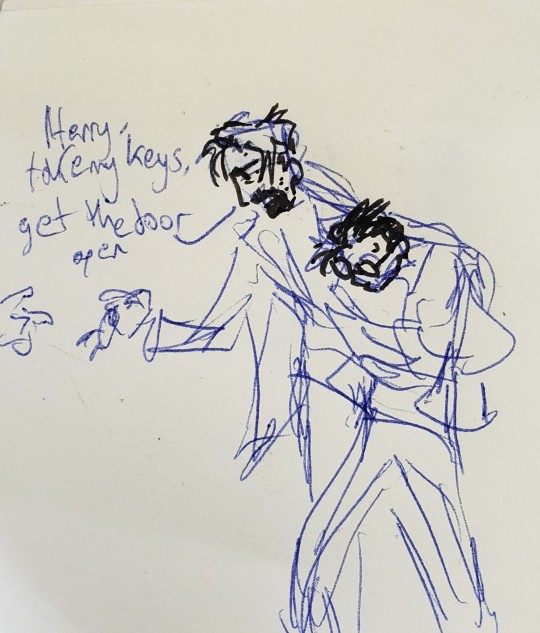
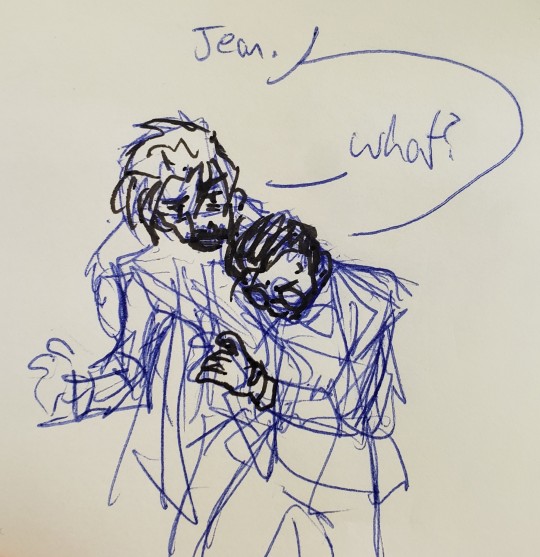
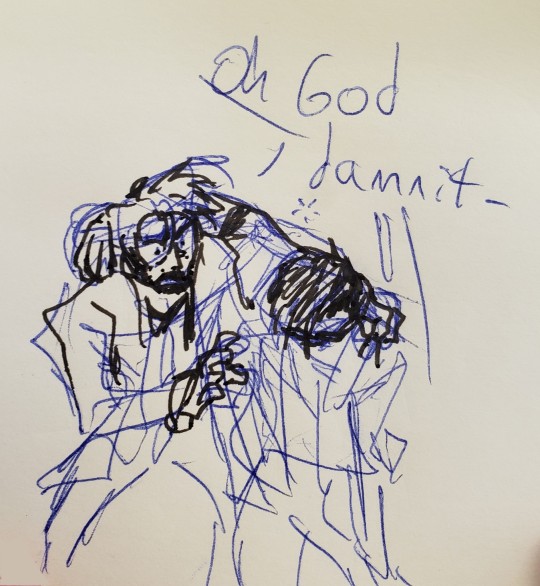
kind of smashing together a bunch of little ideas I've shown off and also kept in my brain privately for fun-having reasons. it's kind of just my dissertation on why kim is absolutely pathetic when you take down his walls. he's a tin soldier. nothing but thin walls and hollow insides. <- OUGH THATS GOOD USING THAT AT SOME POINT
so basically vague handwavey idea that I think its some time into like, the point a lot of the meta-fandom narrative has gotten to, some time down the line after a lot of the initial Mess post-martinaise smooths out into something that looks normalish, or at least isn't an immediate crisis. harry is on a sober streak, [the Hetero-Sexual Life Partners are at the very least not constantly trying to kill each other (kim has had a Talk with Jean, who is mostly just privately seething and malding now and feeling incredibly sorry for himself). ] <OR> [there was an Incident where Jean got really REALLY sorry for himself and made a whole fucking scene and basically tried to kill himself, heavily based on a fic i read (called Trigger Warning) it kinda woobifies jean a bit but other than that its soooo fucking good but tl;dr the jobwives have made up and ] kim and jean are kind of both Harry's partner in ways? jean is still a satellite officer but a lot of times he gets paired up with Harry and kim and they're kind of the nightmare blunt rotation right now.
soooo again handwaves somehow one of the old cases Kim's partner left behind that was left cold picks up a lead again out of the blue and Kim is. well. he's normally a workaholic but this is intense even for him. like Jesus. nobody at the 41st has seen him like this. he doesn't sleep for days on end. (maybe he picks up speed? from jean? he considers doing it in-game to improve his Performance so I don't think thats above him).
anyway rock meet hard place Harry finally gets the poor sod to take a god damn break and go home, he and jean can sort out his disaster area of a desk and cover for him. Kim obliges, goes home and- OH SHIT WHO IS THAT! uhhh its all very vague in my head here but tl;dr Kim gets jumped maybe? nd this was all some sort of like. Ploy? to uhh . idk I think maybe the moralintern is involved in ways. but uh eyes is alive and was an espionage and faked his death and is now like. idrk yet if He stabbed Kim or what, or why its all even. happening in the first place. and tbh its not important to me cause I'm never gonna write it, I don't plan to its just something to play with at night to fall asleep.
important bit is now Kim is Leaking Everywhere and well. doesn't exactly have time to call gotlieb. so. he stitches himself up (NOT THAT WELL) and trudges back to the precinct to report to pryce. understandably people are freaked out by the Blood and stuff. harry comes with Kim to the briefing. shit gets Revealed. Kim dissociate. harry is like uhhhh okay well his home isn't safe anymore. jean can he crash on your couch can you drive us there while I sit in the back with him. and jean is like. fuck. okay. and yeah Kim kinda comes back into it on the ride there, has a Teensy Weensy (HUGEBADMASSIVE) panic attack, eventually calms down enough to clamber out of the car and. jeans apartment is 4 floors up and there's no elevator. hell on earth. Kim refuses to be helped up but 2 floors up he trips and let's jean help him, then they get to the top and Kim is like. Jean. and jean is like what- ohgodyoureunconsciousnowokayharryopenthedoor. and uhhh the rest is pure self indulgent "the boys nurse him back to health mwah" but way messier obvs. like fully "ok I have to take out the stitches you did and restitch you, throw back this glass of whiskey and try not to vomit on me. oh well he passed out. at least he's not feeling it?" and yeah.
anyway there's a Conversation between jean and harry at one point because the through line here is that harry is trying to keep his Boys safe but he doesn't know how they can keep doing This *gestures to the cop thing* and so jean is like okay well are we gonna work the case without him orrrrr and harry is like I am NOT moving a MUSCLE until Kim is 100% okay. he stayed with me for 2 days after I got shot. and jean is like okay bye- and harry is like no listen. I don't. we are killing ourselves here. and jean is like yeah? point? and harry is like maybe we. shouldn't. and they have a whole argument about it but that wakes up Kim who eats shit trying to get up and they both like rush in to make sure he didn't fuck up the new stitches or bust his head open right, and Kim is like. okay conflict resolution time. refuses to back down until everything is explained in detail to him even if he's still loopy. anddddd tl;dr Kim agrees with harry and idk what happens next but there u go
#in the life#disco elysium#kim kitsuragi#im not tagging anyone or anything else#my art#so deeply embarrassed by this self indulgent tripe but#hngh. maybe someone else will like it enough to give it a good home
21 notes
·
View notes
Text
TSR new reader thoughts: chapter 21-26
Chapter 21: Into the Heart
Moiraine POV finally!! I love this POV because it does absolutely nothing to make her a more sympathetic or likeable character. featuring such bangers as "Egwene is getting harder to manipulate, this is really inconvenient" and "When Lan is with me it's annoying because he thinks I need protection, but when he's not with me it's annoying because he should be doing his job and protecting me" and "what the fuck Rand I'm so fucking angry what the FUCK - *outwardly just has the blankest most neutral expression*" truly she is the character of all time.
anyway. Rand is politicking and still doesn't think a woman could ever be a legitimate threat to anything. ok
Chapter 22: Out of the Stone
Aiel culture information, cool. Rand and Egwene reminiscing about the Two Rivers, cute and tragic. Moiraine is so funny in this chapter being upset that Rand is keeping secrets. girl have you met yourself?? also Lan taking Rand's side over Moiraine's - god this woman can't catch a break.
introduction of the fat man angreal I've heard so much about!
Chapter 23: Beyond the Stone
Moiraine was soooo angry at Rand for taking the risk with the stone. also Lan wtf withholding Aiel information from Moiraine. "You have never asked me about them" terrible excuse you've been together for twenty years and it's extremely relevant to the quest you're on RIGHT NOW. this doesn't feel like a Lan move tbh but maybe I just have my rose-colored MoLan glasses on. it really does seem like Lan is distancing himself from Moiraine which I'm upset about.
Aviendha can channel! we're meeting so many channelers from different areas and it's very cool. I think her denial of what the Wise Ones want her life path to be, and eventually caving in, parallels very nicely with our ta'veren protagonists.
Moiraine goes into a tent, drinks some wine, keeps talking over Egwene to get random information about the Aiel, goes on a rant about the Old Tongue that no one really cares about, and then runs out naked to go through a mystery ter'angreal. what an icon.
Chapter 24: Rhuidean
I really don't have a lot to say about this chapter, like, Mat being Mat, some more ter'angreal fuckshit, human skin leather on the creepy guy, okay moving on.
(actually though, WHAT is going on with these redstone doorways, insane. sometimes it's hard to tell with the ter'angreal what magic weirdness will be handwaved away and what will be explored/explained later. either way, though, it's fun to read.)
Chapter 25: The Road to the Spear AND Chapter 26: The Dedicated
holy shit. this is why I read epic fantasy. I'm combining these chapters because they're basically one long chapter of Rand going back through Aiel history. I don't even know what to say except that it was extremely cool, I loved how it traced the history back through one family line, and I was absolutely overwhelmed (in a good way) by the insane amount of lore. it was very smoothly done though. standout moments for me are learning the reason behind the Aiel veiling their faces before they kill, and also WHAT THE FUCK WE GOT THE AGE OF LEGENDS??? on page??? with like, male channelers and futuristic technology and ?????? I'm never recovering.
but yeah, TLDR that was an insane sequence that made me so, so excited for future lore reveals. I'm in it now baby, I'm not just invested in the characters but I'm also so invested in the world Robert Jordan built. there's so much history, so many cultures, and I want to learn about all of it.
< last | next >
3 notes
·
View notes
Text
Joyful Reunion
Translator: foxghost @foxghost tumblr/ko-fi1
Beta: meet-me-in-oblivion @meet-me-in-oblivion tumblr
Original by 非天夜翔 Fei Tian Ye Xiang
Masterpost | Characters, Maps & Other Reference Index
Book 5, Chapter 50 (Part 1)
Guards forcibly drag Mu Kuangda and Mu Jinzhi back inside, and as soon as Mu Jinzhi sees Li Jianhong on the throne, she lets out a high-pitched scream and faints dead away.
Mu Kuangda is already barely breathing to begin with, and upon seeing Li Jianhong’s spectre, even his next breath seems to elude him.
“How … how … how could you be …”
“Mu Kuangda,” Duan Ling says. “How do you plead? Colluding with Han Weiyong to assassinate my dad was treason.”
Blood spurts from Mu Kuangda’s mouth and his eyes bulge from his head; he doesn’t seem able to speak anymore.
“Han Bin,” Duan Ling turns to Han Bin, and says, “How do you plead?”
“Kneel!” Xie You shouts.
A Black Armours soldier steps forward and pushes Han Bin to the floor. Han Bin gets down on both knees, his breath coming in short with dread.
“You colluded with Mu Kuangda,” Duan Ling says. “As calamity befell Shangjing, your reinforcements took their time; and now you hold the officials of the court as hostages in an attempt to force an abdication, and even tried to kill the crown prince.”
Han Bin looks up dazedly at Li Jianhong sitting on the throne. He says suddenly, “You’re not the prince! You’re not …”
“I am not the prince,” the ‘Li Jianhong’ on the throne finally speaks, but what comes out of his mouth is Li Yanqiu’s voice, “but I am the emperor. So it seems your crime has only been made more heinous, General Han.”
The court officials really are scared out of their wits this time, though — if that’s Li Jianhong they can at least handwave this fantastical vision away as an illusion or some such, yet when he opens his mouth and reveals himself to be Li Yanqiu that means they have a real case of a resurrection on their hands! And if the one sitting up there is Li Yanqiu, who the hell is lying in the coffin?!
Those more audacious have already come to the correct conclusion that Li Yanqiu had feigned his death, but it’s just been one surprise after another today, so most of them can’t even get a word out anymore. All they can do is stay on the floor and kowtow.
“Will you plead guilty?” Li Yanqiu says at last, “But whether you admit your guilt or not, you’re clearly guilty anyway. The emperor may be a dead man, but the major officials here are quite alive and can see just fine.”
Now, Han Bin finally understands. He says mournfully, “For Great Chen, I guarded the border for more than a decade and performed deeds of valour in numerous battles, yet you Lis actually came up with a plot to fake your death to lure me back to the capital just so you can kill me. Fine. You beat me fair and square.”
“Beneath Mount Jiangjun, you usurped my father’s command,” Duan Ling says. “You plotted against my father with Mu Kuangda, and the evidence for all this is irrefutable. Last night, I tried to give you one last chance, but alas, you insisted on going your own way, and even tried to kill me, thus adding to the severity of your crimes. I really ought to exterminate the Han clan for this, but for the contributions you have made in guarding Yubiguan for Great Chen, you will be taken to the Meridian Gate and beheaded. Your accomplices will be mercifully exiled. Your execution will take place summarily.”
Xie You replies, “Certainly!”
The Black Armours immediately marches Han Bin outside; Duan Ling isn’t going to give him a single chance to get away at all. Out by the Meridian Gate, someone shouts the command for execution, and soon, another person brings in Han Bin’s head, tossing it to the floor.
“Take the head outside with you,” Duan Ling says. “Pass this on to the three Northern Command divisions: their treason has been pardoned, but they cannot return to guard the north. They will be dispatched to Shandong at a later date.”
“Report!” A Black Armours soldier enters and gets down on one knee. “Marquess Yao launched an ambush outside the city of Jiangzhou and defeated the Northern Command reinforcements, killing seven thousand and capturing ten thousand and more! He has returned in triumph!”
“Very good,” Li Yanqiu says. “Keep a tight watch over the city and the prisoners of war in case of mutiny.”
Li Yanqiu runs his eyes over the court officials. “Cai Yan passed himself off as the crown prince. He was presented with a chance to mend his ways, but he bid Wuluohou Mu kill the crown prince instead. On top of that, he devastated the order of the imperial court, an intolerable offence under the laws of heaven. He is hereby sentenced to the death of a thousand cuts, his corpse to be exposed beneath the elements for three days, and his nine clans exterminated. As his family has already been wiped out, with Feng Duo as his only remaining, distant relative, Feng Duo will also be put to death. The amnesty will not apply to this crime, but as imperial grace is infinite, his father and brother’s corpses will be spared the corpse-flogging. For now, he will be imprisoned in the Celestian Prison to await execution.”
With the pallor of a dead man, Cai Yan is dragged away by the Black Armours.
“Wuluohou Mu,” Duan Ling says softly.
“I attempted to murder the crown prince,” Lang Junxia says, stepping away from the edge of the room, “and I am guilty of deceiving my ruler. Moreover, in failing to repent, I truly deserve a thousand deaths …”
Lang Junxia kneels at the bottom of the steps and looks up at Duan Ling. The corner of his mouth curls up imperceptibly.
Duan Ling heaves a sigh. “You may have committed a crime, yet …”
"I knew, " Lang Junxia says solemnly, “that you’d be sitting in that position someday. There’s nothing I can give you in return, but I hope that on account of my raising you for five years, you would look after Mother Feilian in my stead, and in a few years, give her a respectable sendoff. Other than that, I will not ask for more.”
At the closing of that sentence, a line of blood flows from the corner of Lang Junxia’s mouth, dripping onto the floor.
“Lang Junxia!” Duan Ling’s expression takes on dismay at once, and he cries out involuntarily. He tries to run towards him, but Wu Du is already dashing towards Lang Junxia. Lang Junxia is still kneeling, perfectly still with his back straight. He has closed his eyes.
Wu Du presses his fingers to Lang Junxia’s carotid artery. A moment later, he lets go.
Duan Ling hasn’t even finished talking yet, and tears are already flowing from his eyes frantically. He stumbles out of his seat and almost falls down the stairs, but Li Yanqiu catches him by the arm and puts him back on his seat.
“On account of his past deeds,” Li Yanqiu says, “his body can remain intact after death. Take him away, and bury him with the funeral rites as befitting of the Junior Guardian of the Heir Apparent. And compensate his family as if he was a soldier who died in the line of duty.”
“No … no.” Duan Ling’s voice is shaking. “Wu Du, save him already! I know you can save him. Hurry!”
“The crown prince is tired. Take him to a room so he can get some rest.” Li Yanqiu says. “I am tired as well. There will be titles and gifts for those deserving of such. I hereby declare a general amnesty, and aside from Cai Yan and Mu Kuangda, whose crimes are so heinous as to be unforgivable, the rest can be given suitable pardons.”
Every sound has faded away for Duan Ling, and as Wu Du carries him away from the throne room, his eyes are filled with tears. He wants to yell and cry, but no sound comes out of his throat. Through a mist of tears, he can see an entire court of officials kowtowing to him and Li Yanqiu, saying long give Your Majesty.
And between the officials, Lang Junxia is still kneeling there. Blood drips from the corner of his mouth. His eyes are closed, but he looks exceedingly peaceful, as though he’s merely fallen asleep kneeling.
Autumn wind brushes by; the weather gradually grows cooler.
The Eastern Palace where Cai Yan used to live in has already been abandoned, and Li Yanqiu has established a new Eastern palace in the northeast corner of the palace complex, with the three assassins taking turns to keep watch. He has also transferred many soldiers from the Black Armours so they can live in the palace and take the crown prince’s orders.
Mu Jinzhi has been banished to an abandoned palace hall, and a lot of decisions are still up in the air. The diplomatic delegation remains in Jiangzhou; they had come to give their condolences, but due to a series of unexpected events, the purpose of their trip has turned into celebrating the crown prince’s return to the imperial court. Li Yanqiu announces a general amnesty and arranges for banquets to entertain the officials as well as the visitors. With a single sentence, he glosses over the whole affair by informing everyone that His Majesty of Chen is still very much alive, and that’s that.
Li Yanqiu meets with each of the major officials in turn, comforting them with kind words. Now that the crown prince is back, His Majesty’s disposition has also improved by quite a bit, and he is no longer constantly nitpicking at everything they do. It’s as though he’s completely forgotten how he’d planned to purge the whole lot of them, search and seize their assets, and exterminate their clans.
"Where is His Highness?’ Li Yanqiu comes to the Eastern Palace, searching all over for Duan Ling.
“In the garden,” a bodyguard replies.
“Gardening?”
“No. He’s staring into space.”
Li Yanqiu is seriously sick of Wuluohou Mu — he couldn’t do anything good while he was alive, and now that he’s dead he’s left a thorn in one’s heart.
Duan Ling is sitting in the garden spacing out. Wu Du sits across from him, touching their foreheads together, smiling and talking to him trying to make him feel better. Duan Ling forces a smile, but there is nothing but sorrow in his eyes.
Once, he’d anticipated that this is how everything must turn out in the end, yet the moment it finally came, he still found himself unable to accept it.
“My son.” Li Yanqiu sounds a bit reproachful.
Duan Ling raises his head to meet Li Yanqiu’s eyes, then, he looks down again.
“Uncle,” Duan Ling says quietly.
Li Yanqiu had walked in feeling rather cross, but seeing Duan Ling like this, all his anger fritters away without any reason at all, leaving nothing but a dull ache in his heart.
After Wu Du gets up to salute him, Li Yanqiu sits down in front of Duan Ling. He puts his hand on Duan Ling’s face and strokes his cheek. Duan Ling reaches up to hold Li Yaniu’s hand, feeling a little guilty.
“Why haven’t you come by to see me?” Li Yanqiu says.
“It’s my fault,” Duan Ling says, forcing a smile.
Li Yanqiu walks into the garden, holding Duan Ling’s hand. The yellow leaves of autumn swirl through the air; late autumn is here again.
“If you don’t want to do any administrative work, that’s fine, but you should at least go meet with the envoys. The roads will be difficult to travel on once winter comes, so they’ll have to get going soon.”
“Alright,” Duan Ling says. “I’ll go right away.”
Li Yanqiu seems to want to say some more to advise him, but on second thought decides against it. He adds, “Can you come by every day to have dinner with me?”
Duan Ling nods. A guard is rushing over to report quietly to Li Yanqiu. Li Yanqiu knows there’s still work he’ll have to do, so he can only go. With Mu Kuangda in jail, their nation has no chancellor, and a lot of decisions have fallen onto Li Yanqiu’s shoulders. Li Yanqiu is up to his neck in work, and Duan Ling thinks he really has been neglecting things; he can only pull himself together and do the things he ought to do.
“Did he cry?” As he’s about to leave, Li Yanqiu asks quietly.
“He cried on the day he came back,” Wu Du says in an extremely quiet tone. “He fell asleep afterwards, but once he woke again he’s been a bit out of it. It’s already been three days.”
“Do as you see fit. If he stays this way, I’m going to have to take back the jade arc.”
Li Yanqiu’s never been one to abide by rules, so even things that he’s bestowed on his subordinates can be taken back. Wu Du knows he doesn’t have any other options — this is a hint. He can only nod.
Duan Ling goes back inside and orders a soldier to bring him some of the memorials. And yet, facing a stack of memorials, he simply spends another afternoon staring into space.
This translation is by foxghost, on tumblr and kofi. I do not monetise my hobby translations, but if you’d like to support my work generally or support my light novel habit, you can either buy me a coffee or commission me. This is also to note that if you see this message anywhere else than on tumblr, it was reposted without permission. Do come to my tumblr. It’s ad-free. ↩︎
29 notes
·
View notes
Text
BnHA Chapter 320: Deku vs. Class 1-A
Previously on BnHA: Flashback!Kacchan was all “fuck Deku and fuck his stupid goodbye letters, I need to speak to somebody in charge.” Endeavor was all “hello, I am Somebody In Charge.” Kacchan was all “listen up asshole, you need to let us go out and collect our wayward nerd because you stupidly left him alone with All Might and that’s a fast track to disaster right there.” Endeavor was all, “[self-incriminating silence].” Rat Principal was all, “okay sure, have fun kids.” Back in the present, class 1-A was all “hi Deku” and Deku was all “I’M FINE!!!!!” and Kacchan was all “THAT’S WHAT I THOUGHT YOU’D SAY YOU DUMB FUCKING NERD” and so the kids all got ready to fight, because OF COURSE they’re gonna fight. Sorry guys, but yeah it’s happening.
Today on BnHA: Kacchan is all “what’s up Deku you look like a possessed Rorschach test, so anyway how are the new quirks coming along.” Deku is all “they’re coming along like THIS” and uses Smokescreen to try and get away. Kacchan is all “PHASE ONE COMMENCE”, and Kouda, Sero, Jirou, and Ojiro leap into the fray to shower Deku with heaps of love and violence, because this is a shounen manga and kicking someone’s ass while simultaneously proclaiming your undying admiration for them is just how it’s done in these parts. The KoudaSeroOJirou squad then passes the baton to Satou, Momo, Tokoyami, Kaminari, and Shouji, who are all “fuck this mask” and do a bunch of stuff to tear Deku’s mask off because they’re the real heroes. Shouto is all “LOOK AT THE LITTLE CRYBABY, THAT’S RIGHT, GO AHEAD AND FUCKING CRY and by the way let us share your burden please,” and once again I swear this is all very deeply moving and touching within the actual context. The chapter ends with Tsuyu being all “look at me. I’m the cliffhanger now,” and damn.
lol what
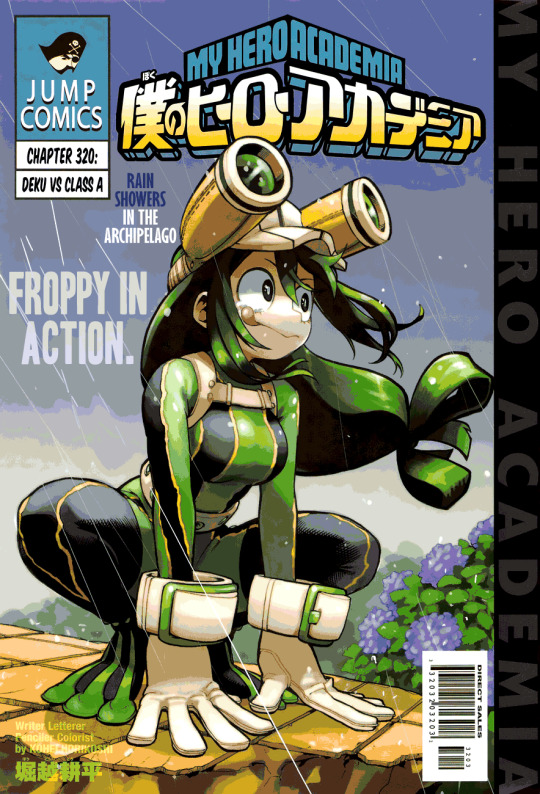
I don’t think anyone was expecting that. I mean, not that I’ve got anything against Tsuyu or anything. anyways it’s a very nice cover and I love the colors and I hope this means Tsuyu’s gonna do something badass
also, “Deku vs Class A” -- pretty much the expected title, but it’s still got me hyped nonetheless fuck yeah let’s go
IIDA ANGST
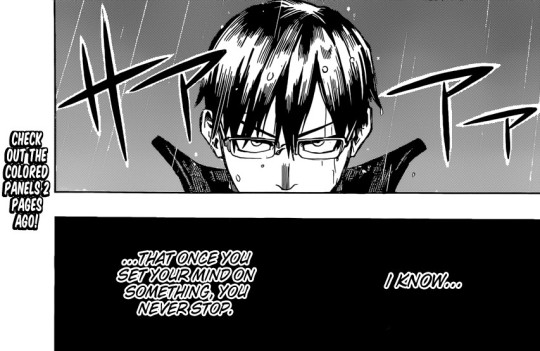
Iida Tenya really said “fuck the uniform code, we’re leaving the helmet at home today.” sorry kids, prim and proper C-3PO Comic Relief Iida has left the building. can I interest you in some Serious Iida
meanwhile Kacchan is all “sup Deku, I heard you got a few more quirks, and might I just add that you look like the Snyder Cut of Detective Pikachu”
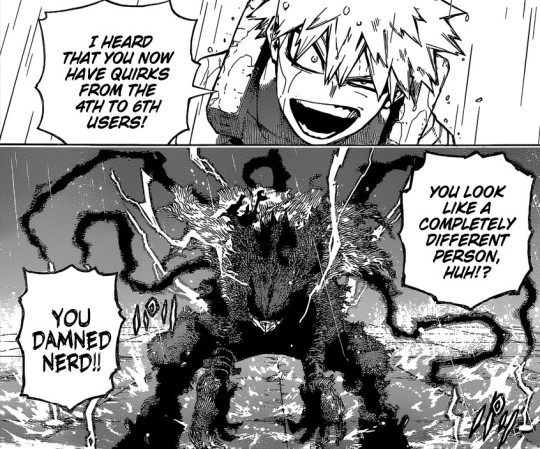
“you look like a tarred and feathered squid” okay easy there Kacchan. I mean it’s all true of course, but still
“thank you all for coming” OH EXCUSE ME SON, WERE YOU PLANNING ON GOING SOMEWHERE. LET’S JUST SEE HOW THAT PLAYS OUT
yep and there’s Smokescreen, right on cue
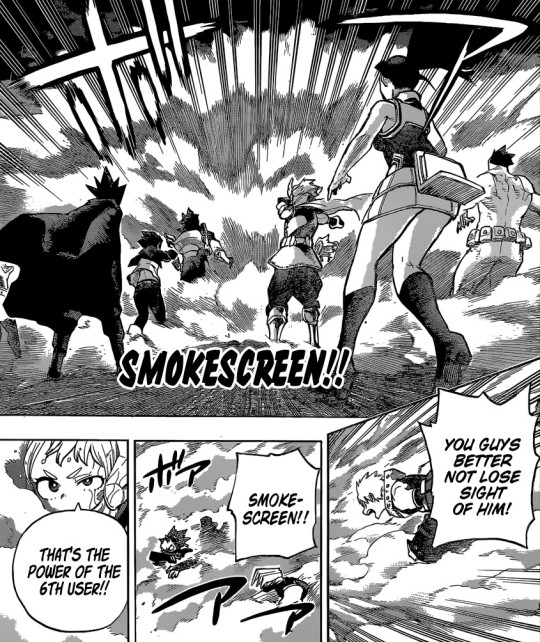
okay Horikoshi, I leave it in your hands. hopefully you can come up with some more interesting combos than my dumbass predictions lol
LOL THIS ISN’T A COMBO AT ALL
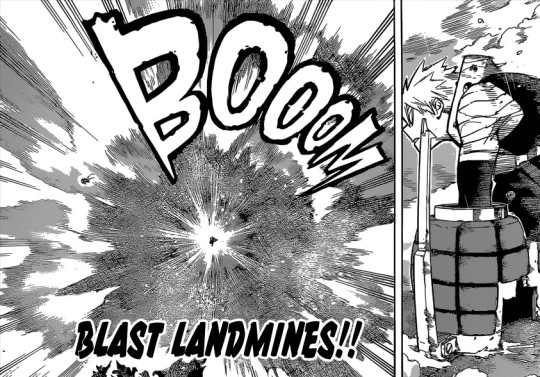
“explosions solve everything” -- Horikoshi Kouhei, 2021. something something shockwave, something something handwave ta-da no more smoke. lol okay then
oh, ouch
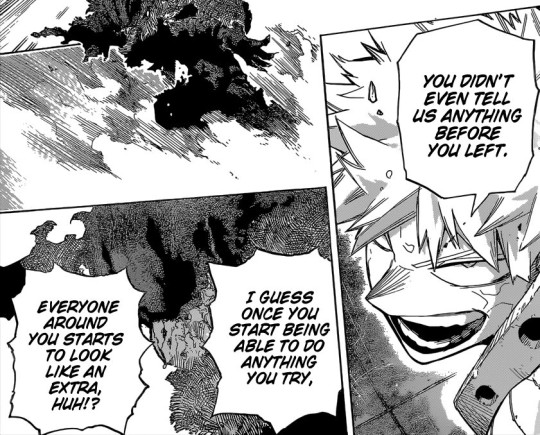
he would know, wouldn’t he. nice application of one of your many hard-earned life lessons, Kacchan
by the way you guys, just as an experiment, I’m going to try to anticipate some of the discourse this week in the hopes of preemptively addressing it and thus saving myself some time later on lol. so here’s our first test run!
ANTICIPATED DISCOURSE: “oh my god what a fucking hypocrite can you believe this fucking guy”
PREEMPTIVE REBUTTAL: it’s precisely because Kacchan has been in this exact situation himself that he’s able to recognize his past self in Deku now and call him out on it. just because it took him sixteen years to get it through his head that he can’t accomplish every single thing completely by himself doesn’t mean Deku has to go down that same path. so yeah, maybe it is a bit hypocritical, but if you insist that the only people qualified to call out stupid shit are people who have never done a single stupid thing in their own lives, then what you’re basically saying is that absolutely no one on earth is qualified lol. so yeah, I’d have to disagree
and one last unrelated note, I’m willing to bet the whole “you didn’t even say a word before you ran off” thing is possibly the first thing Kacchan’s said in this whole encounter that actually does stem from genuine hurt rather than his tough-love-harsh-truths strategy. I’M TAKING NOTES HERE HORIKOSHI. at this rate it’ll take twice as many chapters as DvK2 for them to hash out all the stuff between them, geez
anyway so I gotta say, so far Deku vs. Class A is looking an awful lot like a DvK3 wearing a hat, trenchcoat, and sunglasses lol
OH SHIT I TAKE IT BACK??
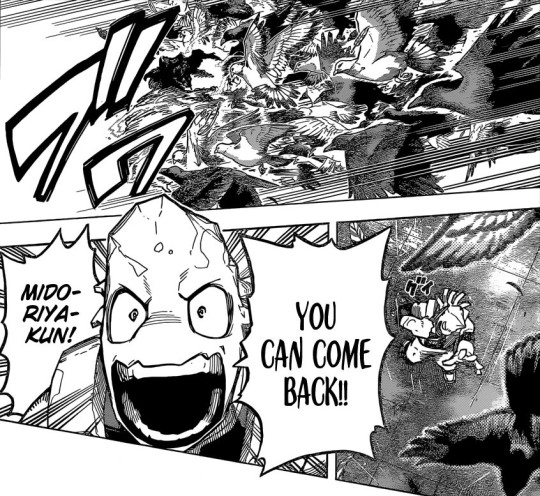
FUCK YEAH, YOU GO KOUDA. and I guess he ditched his mask as well! excellent
so far the strategy here seems to be “Kacchan says all the mean tough love shit while the rest of 1-A balances it out with warmth and kindness”, which actually works pretty well imo. Deku is one of those people that doesn’t usually need a Kacchan Translator anyway, but just in case, this is very efficient
mm but of course Deku is slingshotting himself away with Blackwhip. all right then, who’s up next!
FUCK YEAH
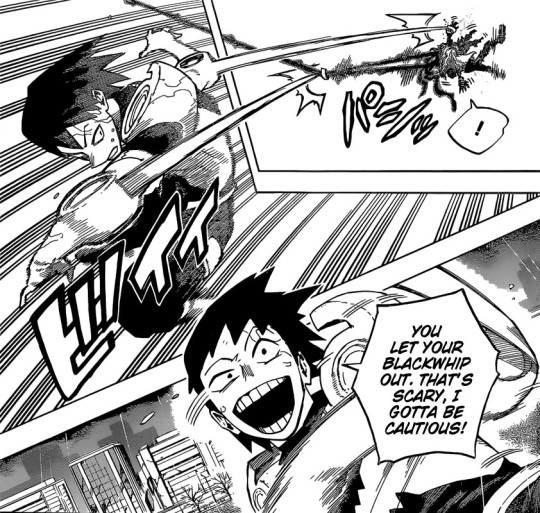
okay but seriously you guys, what is going on with Sero’s face in these last couple of chapters though, it’s really starting to unnerve me. is he trying to emulate Kacchan’s whole asymmetrical facial expressions thing?
in fact let me just quickly hit pause here because,
ANTICIPATED DISCOURSE: “SERO IS TOGA??!”
PREEMPTIVE REBUTTAL: no
oh snap looks like Jirou’s getting in on the action too!
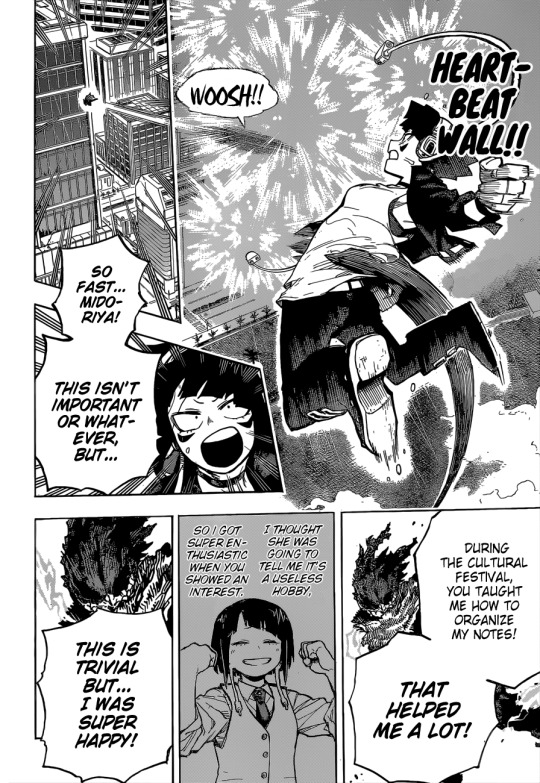
poor Jirou probably spent days racking her brain trying to think of something she could bond with Deku over. is Horikoshi doing these in reverse order of the kids who have had the most interaction with him? that would explain why poor Kouda didn’t get a flashback lol
omg. well that answers that
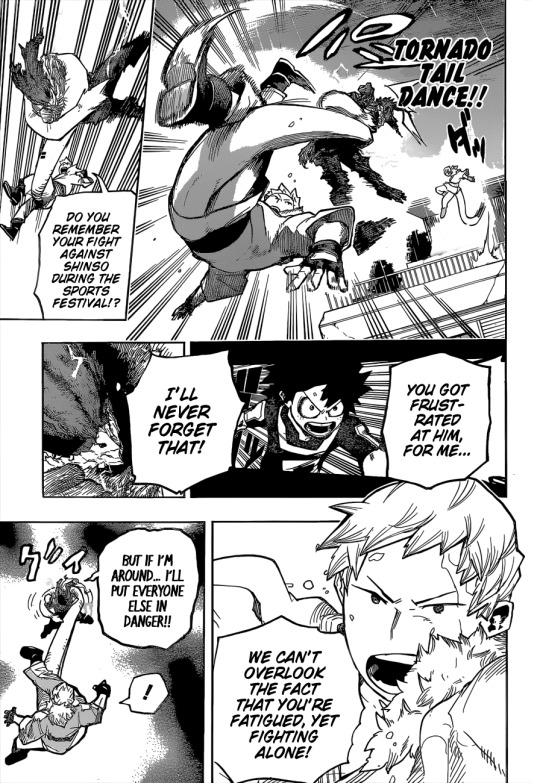
so by my count, Satou and Hagakure are the only ones remaining in this first tier of kids who Still Appreciate Midoriya even though they’ve barely ever spoken two words to him in their lives lol. so they’ll probably be next, and then we’ll get to the next tier of kids who are pretty good friends with him but not quite besties. and then we’ll move on to the IidaRokiRaka trio, and then lastly, to the boy who is in a tier all his own
BUT FIRST, A WORD FROM OUR SPONSOR
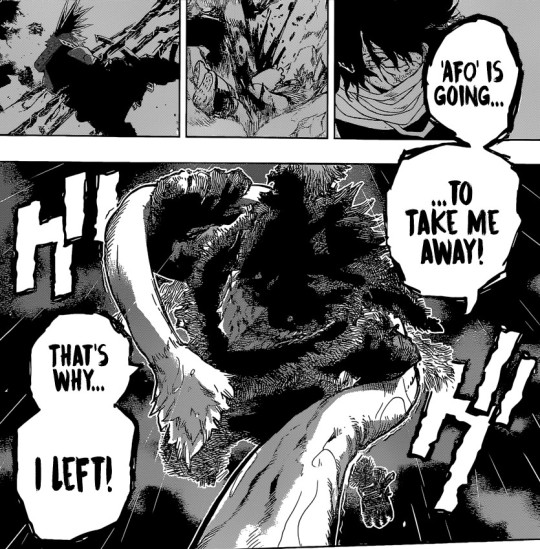
and by “sponsor” I mean the Dekuangst. just in case that wasn’t clear. indeed, many thanks to the Dekuangst for making this all possible
(ETA: okay so this whole “take me away” line seemed pretty weird to me, and sure enough it’s yet another one of those cases where only the verb is specified, and the object is left to the reader’s interpretation. so even though the translation says “take me away”, I’m pretty sure that what Deku’s actually saying is “take you away” -- as in, his loved ones will be taken away by AFO.
and that is literally the way he phrases it, though -- the verb used is “奪う” (ubau), meaning “to snatch away; to dispossess; to steal.” which, god, that hurts my whole goddamn heart though, because for him to say it like that?? not “AFO will kill you”, but “AFO will take you away from me.” he can’t have nice things anymore because of AFO. he can’t be around the people he loves because AFO will hurt them. he can’t have happiness because AFO will take it away from him. anyway so where the fuck is AFO right now, motherfucker I just want to talk.)
by the way can Ojiro just extend his tail to whatever fucking length he wants or what because it’s like twelve feet long in this panel lol
WOOO FUCK YEAH TOKOYAMI
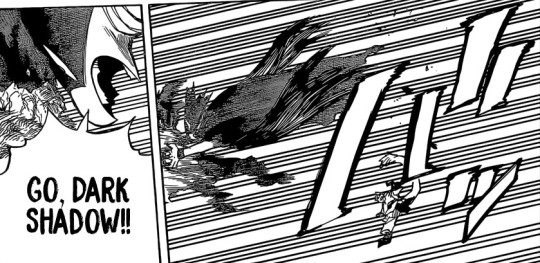
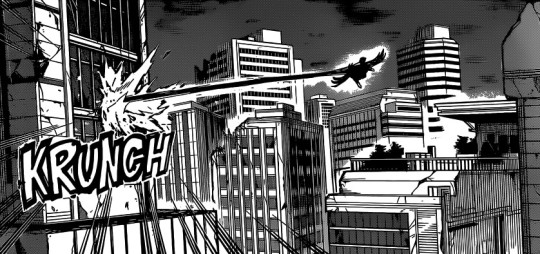
YOU LOVE TO SEE IT!! BUT WHERE’S YOUR FLASHBACK? YOU’VE HAD A BUNCH OF INTERACTIONS WITH HIM, THAT’S NOT FAIR
okay so now Satou’s stepping in which is back to my anticipated order, so maybe Toko will finish his little moment afterward
dskfjfkk
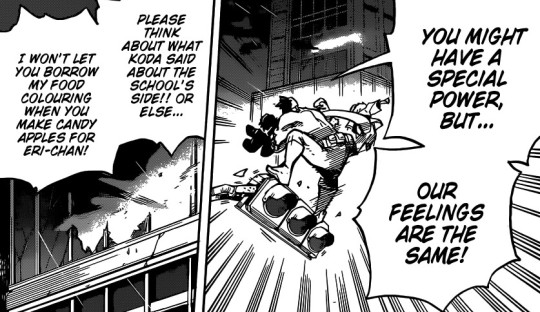
“REMEMBER THAT TIME DEKU BORROWED SATOU’S FOOD COLORING” Horikoshi says, sweating. “AND REMEMBER THAT TIME HE, UM, SMILED IN HAGAKURE’S GENERAL DIRECTION”
actually I am curious about what Hagakure’s part will be because, you know, the whole traitor thing lol
(ETA: funny how we just skipped right over it huh. can we get a traitor reveal countdown started here? definitely getting close to that time.)
whoa lol wtf
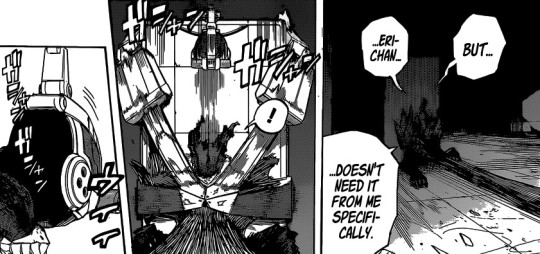
MOMO??? THIS HAS MOMO WRITTEN ALL OVER IT DAMMIT
-- SWEET MOTHER OF FUCK
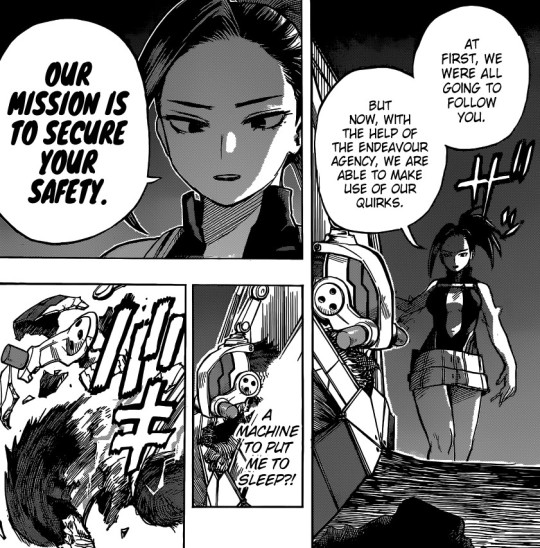
“SORRY MIDORIYA-SAN, I LEFT MY FUCKING CHILL AT HOME IN THE LOCKER NEXT TO IIDA’S HELMET” holy shit lmao
and here I thought she’d get a flashback to her time on the Baku Rescue Squad or something. but nope, no flashbacks from Momo, only terrifying sci-fi torture devices
poor Dark Shadow is such a trooper omg
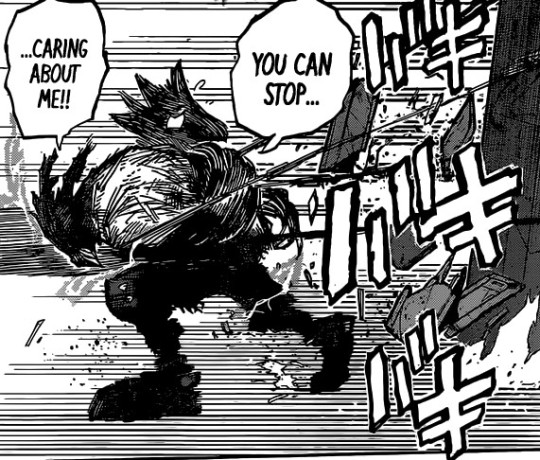
“why am I the only one who has to make prolonged contact with his smelly disgusting self” taking one for the team there DS
FUCK YEAH KAMINARI NO JUTSU
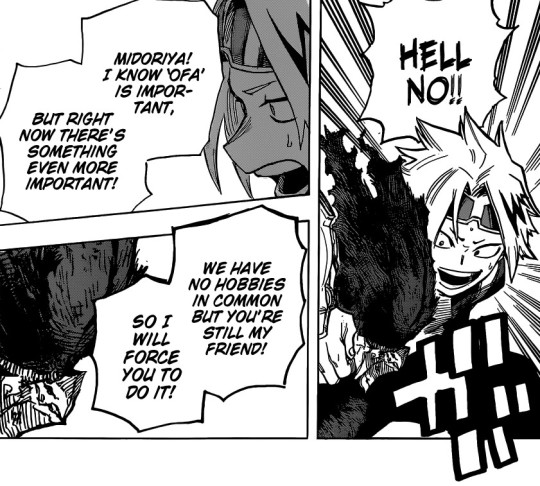
THE PRICKLY BASTARD WHISPERER STRIKES AGAIN!! don’t suppose you brought any clean clothes you could sneakily force him into huh Kami
okay here we go, so now Shouji and Tokoyami are joining forces
um excuse me this is fucking awesome
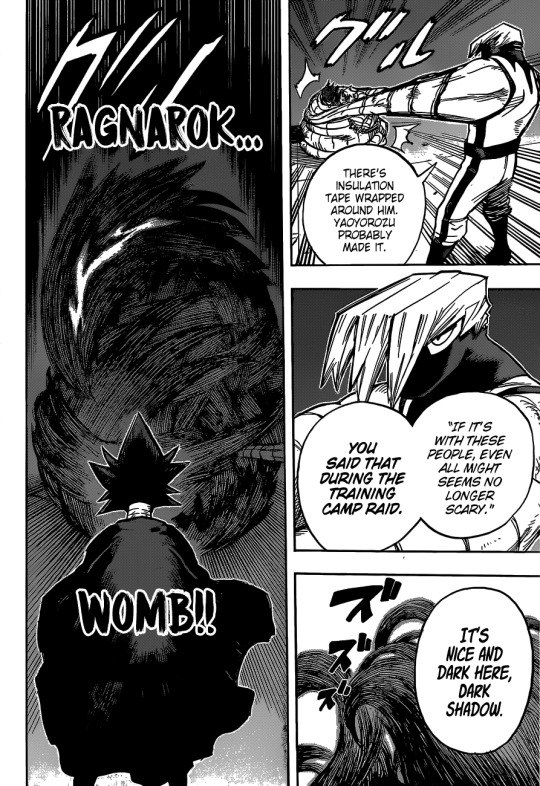
wonder how he’ll break free? don’t think he’ll reveal Fa Jin until the end of the chapter, so maybe Air Force or something? idk
TOKO GETS AN EXTENDED MOMENT BECAUSE HE IS A TIER TWO PATREON REWARD LEVEL FRIEND YAY
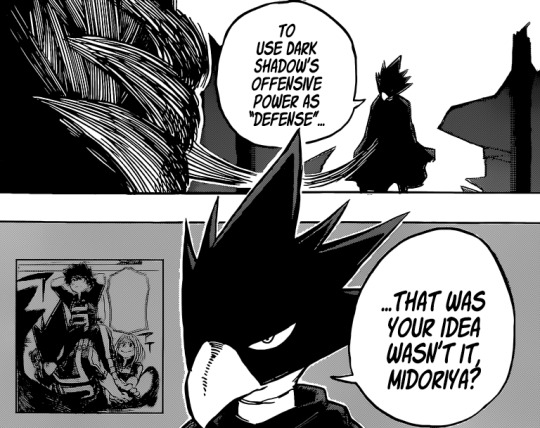
WHY IS MOMO MAKING THIS FACE LOL YOUR THING WAS WAY WORSE
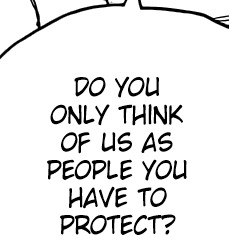
and Shouji just casually hitting him with what is easily the best comment from anyone yet. too bad Deku’s just gonna ignore it. you deserve better Shouji
KAMINARI OMFG
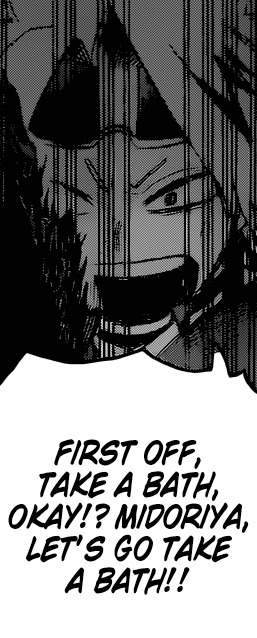
it only just occurred to me that Kami is currently trapped inside Dark Shadow right along with him lmao omg. realest one in the entirety of BnHA, right here. we will never forget your sacrifice
aaaaaaand Deku’s yeeting himself
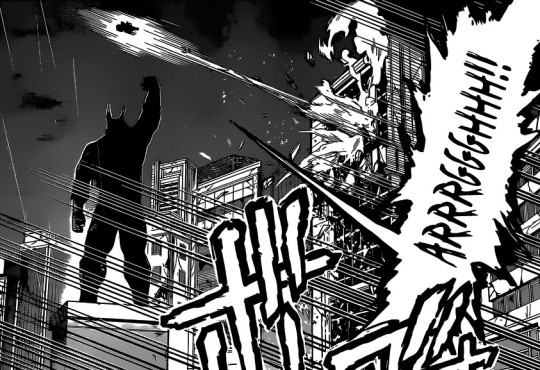
do you really hate the thought of taking a bath that much my dude
oh shit the mask!!
-- oh shit the feels
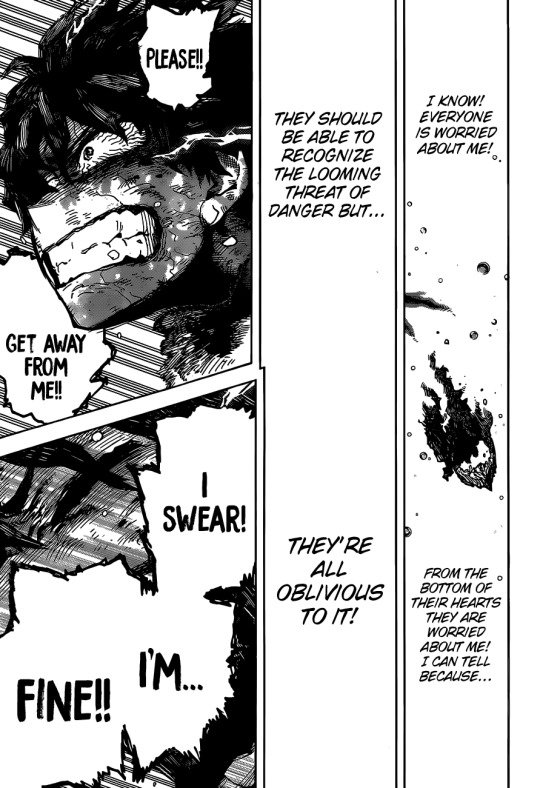
o(TヘTo)
fuck. and I mean, we knew he was crying, that was a done deal. but still, to see him in this much pain is just...
and the acknowledgement that he knows they’re worried about him, but that it doesn’t change his mind one bit. this, right here, is why they have to be a bit harsh with him, you guys. because they’re up against the full, unbridled stubbornness of Midoriya fucking Izuku, and if they don’t match that stubbornness with an equal stubbornness of their own, they basically don’t stand a chance
(ETA: quick note that there is apparently another mistranslation here -- rather than saying that his friends are oblivious to the danger, what Deku is actually saying is that none of his friends have activated his Danger Sense once throughout this entire fight. which I had been wondering about, and it turns out Horikoshi actually confirmed it. so basically none of the kids bears any ill intent toward him, and there’s literal proof right there.
incidentally, as @class1akids pointed out, this also casts an interesting light on this chapter in terms of who hasn’t fought Deku yet. not to play the Hagakure Traitor Music for the billionth time you guys, but I’M JUST SAYING lol.)
anyway, but the good news is that they all seem to understand that. and the even better news is that we have reached the tier 3 friends!!
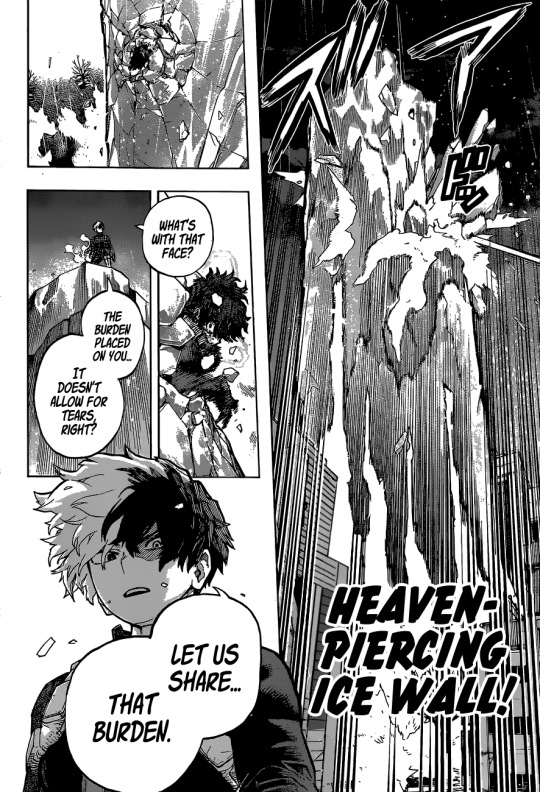
“OR ELSE” lol, great to see Shouto wielding his friendship just as aggressively as Deku once did towards him. I do love a good role reversal
p.s., ANTICIPATED DISCOURSE: “why is Shouto being so cruel to Deku can’t he see how hard this is on him”
PREEMPTIVE REBUTTAL: this is a callback to the classic “even heroes cry when they have to” Shouto line from chapter 137. Shouto is clearly following Kacchan’s lead here and going for the more ruthless approach, knowing that the gentle approach isn’t getting through to him (if anything it’s only making him more stubborn as we saw on the previous page). basically it’s his way of pointing out that even heroes are still only human, and so is Deku last time he checked
ah okay, and there Tsuyu is at last

okay real talk, I get why Tsuyu is included in the tier 3 friends, because she was one of the first people to team up with Deku going all the way back to USJ. but that said, this probably would have had more impact if their most recent interaction hadn’t been like 150 chapters ago
but anyway though it’s still a good speech. maybe not quite a cliffhanger-level speech, but a good speech nonetheless. in a way though, I’m glad to see that Horikoshi seemingly didn’t give a fuck whether he ended this on an actual cliffhanger or not for once
and that “headed toward the climax” part has me excited too, ngl. because if we really are getting to the so-called climax this soon, that makes me even more certain that there is indeed a DvK3 in the forecast. so I presume that next week (or I guess two weeks from now) will be the tier 3s along with the remaining tier 2s like Kirishima and Aoyama
and then after that, well... [orange and green banners being hoisted] [sound of screeching airhorns and vuvuzelas in the distance] [sound of All Might approaching in his car which I didn’t notice until I looked back at this page a second time whoops] THE PROPHECY WILL NOT BE DENIED
#bnha 320#midoriya izuku#bakugou katsuki#asui tsuyu#tokoyami fumikage#kaminari denki#todoroki shouto#class 1-a#bnha#boku no hero academia#bnha spoilers#mha spoilers#bnha manga spoilers#makeste reads bnha
365 notes
·
View notes
Text
NANDOR: Please, I am speaking here! And when I was the leader of my country, I would kill anyone who disrespected me when I’m talking about candles.
COLIN ROBINSON: You were the leader of a country?
NANDOR: Yes. I was the leader of Al Quolanudar.
LASZLO: That sounds like you just made it up.
COLIN: Sounds fake.
NANDOR: No, I have not just made it up, it’s a real country, it’s not a fake country, it’s a real country, Al Quolanudar.
NADJA: Bless you.
NANDOR: Guillermo, go on your intelligent telephone machine and look it up.
GUILLERMO: Spell that? A…
- S1e8, Citizenship
So, like everyone else in the WWDITS tag, I am Normal About This Show, and thus I have spent way too long thinking about how that exchange makes no sense and how to make it make sense. YES, the real explanation is that it was early in the show and it was the funniest way to do the reveal that Al Quolanudar dissolved and set off the A plot of the episode, but I have still decided to dedicate an extended amount of time to hammering out a Watsonian explanation and now you have to suffer with me as I explain how I handwave many of the inconsistencies/what I as a vaguely obsessive person perceive as inconsistencies in this show.
Anyway, first—why does it not make sense? Well, Nandor’s 750+. There’s no point in time in between that and 2019 where he found out that his country, which he used to rule, dissolved? He’s also the one who, later in the episode, pinpoints it as part of Southern Iran, and it doesn’t seem to be something he just discovered. We also find out that he already started the citizenship process, and I feel like some basic research about his place of birth would’ve AT LEAST come up then.
Then, when it comes to the other vampires asking about it…well, in season 3, we find out that the Staten Island house has been celebrating Nandor’s Accession Day for years. And even if we ignore that because it’s clear that the writers did not have that planned when writing s1e8, Nandor never shuts up about how he was ruler of Al Quolanudar! The possibility that anyone in that house wasn’t aware of that aspect of his past is zero.
But!!! There’s totally an explanation!!! And by explanation I mean my headcanon, which is that Al Quolanudar existing as the place Nandor ruled and Al Quolanudar being dissolved isn’t new information to the vampires + human of the Staten Island house. Nandor himself became aware of it—and probably had a crisis about it—in the 1400s. It’s just that by the time the episode rolled around, he’d forgotten. And if you forget something completely enough, it’s still a revelation when you find out about it again.
Colin Robinson, for his part, is just goading Nandor, potentially even being kind of sarcastic. “Oh, really? You were the leader of a country? No kidding.” Naturally, Nadja and Laszlo can’t help but join in on the teasing. Then when it comes to Al Quolanudar having been dissolved, I think that Colin totally already knew and it’s a question mark whether Nadja and Laszlo did.
Guillermo, however, absolutely knew Al Quolanudar had dissolved. But he also knew Nandor DIDN’T know. (And probably never really spent too much time thinking that he ever might have known because that’s, like, kinda sad when you dwell on it too long.) He never broke the news to Nandor because he didn’t want to upset him. He was fumbling with his phone and asking about spelling because he was trying to act like he had no idea what was up with Al Quolanudar, a place he had DEFINITELY googled because he’s known Nandor ten years at that point. He and Laszlo just went to the same “ignorance is bliss” school of friendship in this case.
Anyway, a lot of “wait, how does that make sense?” moments in the show or moments where characters seem to know less about each other or themselves than one might expect are easily explained, imo, by the ravages of time and inconsistencies of memory, especially with Nandor. (For example, I personally think that a non-zero amount of the interactions we see Nandor and Guillermo have are interactions they’ve had before, probably multiple times, that Nandor just kind of forgot. But that’s a meta for another time.)
#wwdits#nandor the relentless#guillermo de la cruz#my 30000 memory loss headcanons for this show#idk if this is actually anything or makes sense#inb4 but you’re taking the silly vampire show 2seriously!!! shut UP this is fun to me#what we do in the shadows#wwdits meta
77 notes
·
View notes
Text
The Crows Summon the Sun
Or, Hamliet’s review of Shadow & Bone, which gets a 4.5/5 for enjoyment and a 3.5/5 in terms of writing.
The true heroes of this story and the saviors of the show are the Crows. However, the problem is that the show then has an uneven feel, because the strength of the Crows plotline highlights the weaknesses of the trilogy storyline. But imo, overall, the strengths overshadow (#punintended) the weaknesses.
I’ll divide the review into the narrative and the technical (show stuff, social commentary), starting with narrative.
Narrative: The Good
It’s What The Crows Deserve
I went into the show watching it for the Crows; however, knowing that their storyline was intended to be a prequel, I wasn’t terribly optimistic. And while it is a prequel, the characters have complete and full arcs that perfectly set them up for the further development they will have in the books (which I think should be the next season?). Instead of retreading the arcs they’d have in the books, which is how prequels usually go, they had perfect set up for these arcs. It’s really excellent.
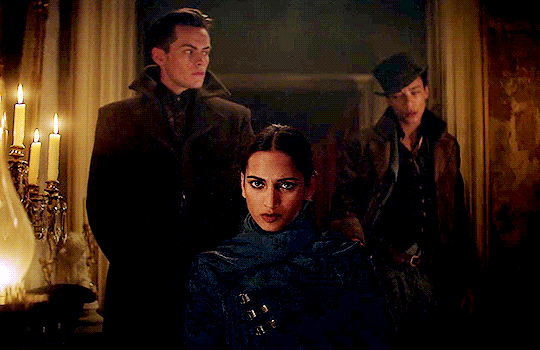
Jesper, Inej, and Kaz are all allowed to be flawed, to have serious conflicts with one another, and yet to love each other. They feel like a found family in the best of ways. Kaz is the perfect selfish rogue; he’s a much more successfully executed Byronic hero than the Darkling, actually. Inej is heroic and her faith is not mocked, yet she too is flawed and her choices are not always entirely justified, but instead left to the audience to ponder (like killing the girl), which is a more mature writing choice that I appreciated.
Jesper is charming, has a heart of gold despite being a murderer and on the surface fairly greedy, and MILO THE EMOTIONAL SUPPORT GOAT WAS THE BEST THING EVER. I also liked Jesper’s fling with Dima but I felt it could be better used rather than merely establishing his sexuality, like if Jesper and Dima had seen each other one more time or something had come of their tryst for the plot/themes/development of Jesper.
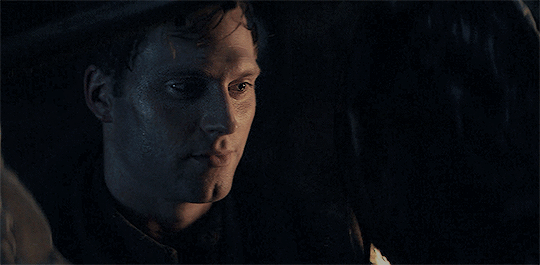
Nina and Matthias’s backstory being in the first season, instead of in flashbacks, really works because it automatically erases any discomfort of the implications of Nina having falsely accused Matthias that the books start with. We know Nina, we know Matthias, we know their motivations, backgrounds, and why they feel the way we do. It’ll be easy for the audience to root for them without a lot of unnecessary hate springing from misunderstanding Nina (since she’s my favorite). Matthias’s arc was also really strongly executed and satisfyingly tragic. Their plotline was a bit unfortunately disconnected from the rest of the story, but Danielle Gallagan and Callahan Skogman have absolutely sizzling chemistry so I found myself looking forward to their scenes instead of feeling distracted. Also? It’s nice seeing a woman with Nina’s body type as a romantic and powerful character.
Hamliet Likes Malina Now
Insofar as the trilogy storyline goes, the best change the show made was Mal. He still is the same character from the books, but much more likable. The pining was... a lot (too much in episode 4, I felt) but Malina is a ship I actually enjoyed in the show while I NOTP’d it in the books. Mal has complexity and layers to his motivations (somewhat) and a likable if awkward charm. Archie Renaux was fantastic.
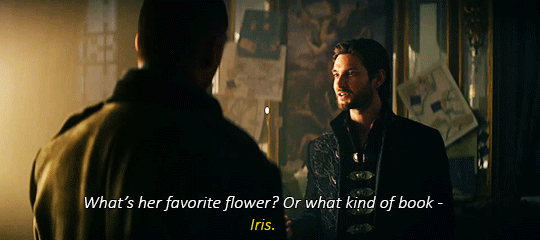
Ben Barnes is the perfect Aleksandr Kirigan, and 15 year old me, who had the biggest of big crushes on Ben Barnes (first celebrity crush over a decade ago lol), was pretty damn happy lol. He’s magnificantly acted--sympathetic and terrifying, sincerely caring and yet villainous in moments. Story-wise, I think it was smart to reveal his name earlier on than in the books, because it helps with the humanization especially in a visual medium like film. Luda was a fitting (if heartbreaking) backstory, but it is also hard for me to stomach knowing what the endgame of his character is. Like... I get the X-men fallacy thing, but I hope the show gives more kindness to his character than the books did, yet I’m afraid to hold my breath. Just saying that if you employ save the cat, if you directly say you added this part (Luda) to make the character more likable (as the director did) please do not punish the audience for feeling what you intended.
I also liked the change that made Alina half-Shu. It adds well to her arc and fits with her character, actually giving her motivations (she kinda just wants to be ordinary in a lot of ways) a much more interesting foundation than in the books. Also it’s nice not to have another knock-off Daenerys (looking to you Celaena and book!Alina). Jessie Mei Li does a good job playing Alina’s insecurities and emotions, but...
Narrative: The Ehhhhhhh
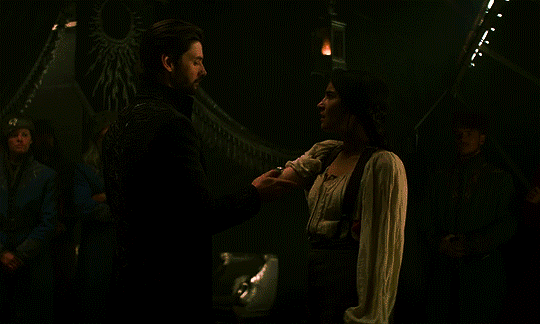
Alina the Lamp
Sigh. Here we go. Alina has little consistent characterization. She’s almost always passive when we see her, yet she apparently punches an officer for calling her a name and this seems to be normal for her, but it doesn’t fit at all with what we know about her thus far. Contradictions are a part of humanity, but it’s never given any focus, so it comes across as inconsistent instead of a flaw or repression.
I have no idea what Alina wants, beside that she wants to be with Mal, which is fine except I have no idea what the basis of their bond is. Even with like, other childhood friends to lovers like Ren/Nora in RWBY or Eren/Mikasa in SnK, there’s an inciting moment, a reason, that we learn very early on in their story to show us what draws them together. Alina and Mal just don’t have that. There’s the meadow/running away thing, but they were already so close, and why? Why, exactly? What brought them together? The term “bullies” is thrown around but it isn’t ever explored and it needed to be this season. If I have to deal with intense pining for so many episodes at least give me a foundation for their devotion. You need to put this in the beginning, in the first season. You just do.
A “lamp” character is a common metaphor to describe a bad character: essentially, you could replace the character with a lamp and nothing changes. Considering Alina’s gift is light, it’s a funnily apt metaphor, but it really does apply. Her choices just don’t... matter. She could be a special lamp everyone is fighting over and almost nothing would change. The ironic thing is that everyone treating her like a fancy lamp is exactly the conflict, but it’s never delved into. We’re never shown that Alina is more than a lamp. She never has to struggle because her choices are made for her and information is gifted to her when she needs it. Not making choices protects Alina from consequences and the story gives her little incentive to change that; in fact, things tend to turn out better when she doesn’t make choices (magic stags will arrive).
Like... let’s look at a few occasions when Alina almost or does make choices. For example, she chooses to (it seems) sleep with Kirigan, but then there’s a convenient knock at the door and Bhagra arrives with key information that changes Alina’s mind instantly despite the fact that Bhagra’s been pretty terrible to her. If you want to write a woman realizing she’s been duped by a cruel man, show her discovering it instead of having the man’s abusive mother tell her when she had absolutely no such suspicions beforehand. There’s no emotional weight there because Alina doesn’t struggle.
When she is actually allowed to carry out a bad choice, the consequences are handwaved away instead of built into a challenge for her. Like... Alina got her friends killed. More than once. I’m not saying she’s entirely to blame for these but could we show her reacting to it? Feeling any sort of grief? She never mentions Raisa or Alexei after they’re gone, just Mal, and I’m... okay. They were there because of you. Aren’t you feeling anything? Aren’t you sad? The only time Alina brings up her friends’ deaths is to tell Kirigan he killed her friends when they were only there because she burned the maps. She yells at Kirigan for “never” giving her a choice, but she almost never makes any, so why would he? Alina has the gall to lecture Genya about choices, but she herself almost never has to make any.
Which brings me to another complaint in general: Alina’s lack of care for everyone around her when they’re not Mal, even if they care for her. Marie dies because of her (absolutely not her fault of course) but as far as we know she never even learns about Marie. She certainly doesn’t ever ask about her or Nadia. Alina seems apathetic at best to people, certainly not compassionate or kind.
The frustrating thing is that there is potential here. Like, it actually makes a lot of psychological sense for an orphan who has grown up losing to be reluctant to care for people outside of her orbit and that she would struggle to believe she can have any say in her destiny (ie make choices). It’s also interesting that a girl who feels like an outsider views others outside her. But the show never offers examines Alina’s psychology with any depth; it simply tells us she’s compassionate when she is demonstrably not, it tells us she makes decisions when it takes magical intervention to do so. It’s a missed opportunity. This does not change between episodes 1 and 8, despite the episodes’ parallel structures and scenes, which unintentionally reinforces that Alina had little real development.
Inej and ironically Jesper and Kaz embody the concept of “mercy” far better and with far more complexity than Alina does. The Crows have reactions to the loss of people who even betray them (Arken, etc), learn, and course-correct (or don’t) when they are even loosely involved in having strangers die. They’re good characters because they change and learn and have their choices matter. When they kill we see them wrestle with it and what this means even if they are accustomed to doing so. Jesper can’t kill in front of a child. Kaz wonders what his killings do to Inej’s idea of him.
Narrative: The Mixed Bag
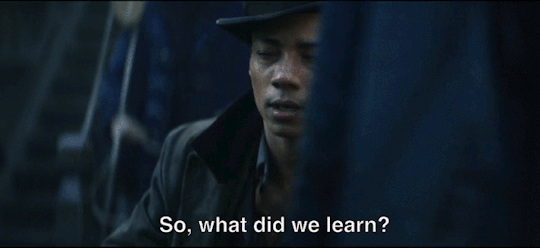
Tropes, Themes, Telling vs. Showing
So the show’s themes in the Alina storyline are a mess, as they are in the trilogy too. Tropes are a very valuable way to show your audience what you’re trying to say. They’re utilized worldwide because they resonate with people and we know what to expect from them. The Crows' storyline shows us what it wants us to learn.
Preaching tells, and unfortunately, the trilogy relies on telling/preaching against fornicationBad Boys. It’s your right to write any trope or trample any trope you want--your story--but you should at least understand what/why you are doing so. The author clearly knows enough about Jungian shadows and dark/light yin/yang symbolism to use it in the story, but then just handwaves it away as “I don’t like this” but never does so in a narratively effective way: addressing the appeal in the first place. If you really wanna deconstruct a trope, you gotta empathize with the core of the reason these tropes appeal to people (it allays deep fears that we are ourselves unlovable, through loving another person despite how beastly they can be), and address this instead of ignoring it. Show us a better way through the Fold of your story. Don’t just go around it and ignore the issue.
The trilogy offers highly simplistic themes at best--bad boy bad and good boy good, which is fine-ish for kid lit but less fine for adult complexity, which the show (more so than the books) seems to try to push despite not actually having much of it.
Alina and Mal are intended to be good, we’re told they are, but I’m not sure why beyond just that we’re told so. Alina claims the stag chose her, but in the show it’s never explained why at all. Unlike with Kaz, Inej, Jesper, and hell even Matthias and Nina, we don’t see Alina or Mal’s complex choices and internal wrestling.
Like, Inej’s half-episode where she almost killed the guy they needed was far more character exploration than Alina has the entire show, to say nothing of Inej’s later killing which not only makes her leaps and bounds more interesting, but ironically cements her as a far more compelling and yes, likable, heroine than Alina. We see Inej’s emotional and moral conflict. We can relate to her. We see Kaz struggling with his selfishness and regrets, with his understanding of himself through his interactions with and observations of Inej, Alina, the Darkling, Arken, and Jesper.
We don’t explore what makes Mal or Alina good and what makes them bad. We don’t know what Alina discovers about herself, what her power means for her. We are told they are good, we are told she knows her power is hers, but never shown what this means or what this costs them/her. Their opportunities to be good are handed to them (the stag, Bhagra) instead of given to them as a challenge in which they risk things, in which doing good or making a merciful choice costs them. Alina gets to preach about choices without ever making any; Inej risks going back to the Menagerie to trust Kaz. Her choices risk. They cost. They matter and direct her storyline and her arc, and those of the people around her.
Production Stuff:
The Good:
The production overall is quite excellent. The costumes, pacing, acting, and cinematography (for example, one of the earliest scenes between the Darkling and Alina has Alina with her back to the light, face covered in his shadow, while the Darkling’s face is light up by her light even if he stands in the shadows) are top-notch. The soundtrack as well is incredible and emphasizes the scenes playing. The actors have great chemistry together, friend chemistry and romantic when necessary (Mal and Alina, the Darkling and Alina, Kaz and Inej, Nina and Matthias, David and Genya, etc.) All are perfectly cast.
The Uncomfortable Technicalities Hamliet Wants to Bitch About:
The only characters from fantasy!Europe having any trace of an accent reminiscent of said fantasy country's real-world equivalent are antagonists like Druskelle (Scandinavia) and Pekka (Ireland). When the heroes mostly have British accents despite being from fantasy Russia and Holland, it is certainly A Choice to have the Irish accent emphasized. The actor is British by the way, so I presume he purposely put on an Irish accent. I'm sure no one even considered the potential implications of this but it is A Look nonetheless.
The Anachronisms Hamliet Has a Pet Peeve About:
The worldbuilding is compelling, but the only blight on the worldbuilding within the story itself (ignoring context) was that there are some anachronisms that took me out of the story, particularly in the first episode where “would you like to share with the class” and “saved by the horn” are both used. Both are modern-day idioms in English that just don’t fit, especially the latter. The last episode uses “the friends we made along the way.” There are other modern idioms as well.
IT’S STARKOVA and Other Pet Peeves Around the Russian Portrayal
Russian names are not hard, and Russian naming systems are very, very easy to learn. I could have waved “Starkov” not being “Starkova,” “Nazyalensky” not being “Nazyalenskaya,” and “Safin” not being “Safina” as an American interpretation (since in America, the names do not femininize). However, “Mozorova” as a man is unfathomable and suggests to me the author just doesn’t understand how names work, which is a bit... uh okay considering a simple google search gets you to understand Russian names. They aren’t hard. I cannot understand why the show did not fix this. It is so simple to fix and would be a major way to help the story’s overall... caricature of Russia.
Speaking of that... Ravka is supposedly Russian-based, but it is more accurately based on the stereotypes of what Americans think of Russia. Amerussia? Russica? Not great.
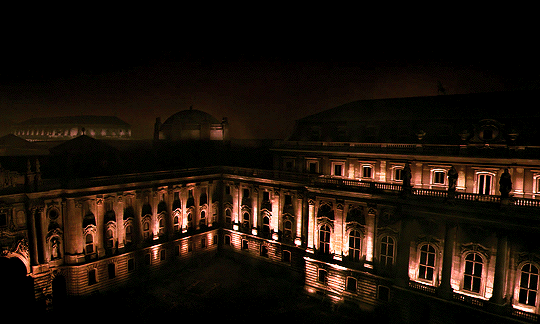
The royals are exactly what Americans think of the Romanovs, right down to the “greasy” “spiritual advisor” who is clearly Rasputin and which ignores the Romanov history, very real tragedy, and the reason Rasputin was present in the court. The religion with all its saints is a vapid reflection of Russian Orthodoxy. The military portrayal with its lotteries and brutality and war is how the US views the Russian military. The emphasis on orphans, constant starvation, classification, and children being ripped from their homes to serve the government is a classic US understanding of USSR communism right down to the USSR having weapons of destruction the rest of the world fears (Grisha). Not trying to defend the Soviet Union here at all, but it is simplistic and reductive and probably done unconsciously but still ehhhh.
However, I’m not Russian. I just studied Russian literature. I’ve seen very little by way of discussion of this topic online, but what I do see from Russian people has been mixed--some mind, some don’t. The reality is that I actually don’t really mind this because it’s fantasy, though I see why some do. I'm not like CANCEL THIS. So why am I talking about this beyond just having a pet peeve?
Well, because it is a valid critique, and because it doesn’t occur in a vacuum. The Grishaverse is heralded as an almost paragon for woke Young Adult literature, which underlines itself what so frustrates me about how literary circles discuss issues of diversity and culture. Such praise, while ignoring its quasi-caricature of Russia, reflects a very ethnocentric (specifically American) understanding of culture, appropriation, and representation. All stories are products of their culture to various extents, but it bothers me on principle what the lit community reacts (and overreacts sometimes?) to and what people give a pass to. The answer to what the community reacts to and what it gives a pass always pivots on how palatable the appropriation is to American understandings and sensibilities. There’s nuance here as well, though.
I'm not cancelling the story or thinking it should be harshly attacked for this, but it is something that can be discussed and imo should be far more often--but with the nuance it begs, instead of black/white. But that’s a tall ask.
#s&b#hamliet reviews#shadow and bone#six of crows#kanej#jesper fahey#kaz brekker#inej ghafa#alina starkov#malyen oretsev#the darkling#darklina#malina#aleksander kirigan#netflix shadow and bone#s&b review
276 notes
·
View notes
Note
I know it's weird, but I always thought that Ironwood's idea of security was pretty dumb, he pretty much brings hackable soldiers and still keeps them even after the tower incident and doesn't even try to be subtle about it, that easily causes panic.
If he really wanted to be safe, just human soldiers and huntsman would've been enough.
Hell, the main reason Robyn was against him was just Cinder giving him a bad rep, telling her everything would have really helped.
I'm not saying that Ironwood's character was done well, but rwde critics constantly deify him and handwaved his mistakes and said they weren't his mistakes.
Based on my experience, it's not that critics are denying his flaws or mistakes, but rather that they're refusing to think the worst of him in a story that, frankly, doesn't give us all the information we need to make an informed decision about responsibility.
Let's take the examples you've laid out. Yeah, in retrospect having hackable soldiers was a huge mistake and for a 21st century viewer, it's indeed super obvious that technology is a fallible tool. However, RWBY (to my recollection) never imbued Remnant with that same knowledge, nor those same concerns. Atlas is treated like a technological marvel — supposedly the world's only given how often such-and-such invention is Atlas' — and any technology, in turn, is treated as a boon, not something capable of harm. Dust, weapons, mechs, an adorable android girl... all of it is painted in a utopian-ish light and what very few hints we get at potential pitfalls — like the White Fang stealing those mechs and Roman attacking the group with one — are never explored. At no point in Volumes 1-3 is the narrative concerned with the dangers such technology presents, including hacks. The Remnant world reacts like Ironwood's army getting hacked really is a shocking, totally unexpected thing that no one considered as a possibility — except the villains looking to enact that harm. So if this is a world where what's obvious to us has yet to be discovered by these characters, Ironwood isn't any more of a fool than everyone else. No one expected Cinder's hack: not him, not his scientists, not the level-headed Glynda, not Ozpin who tells him to use his soldiers now that they're here... that's why this is a tragedy. And trying to read RWBY through that, "Well, it's obvious to me that this was stupid" ignores what little, cultural world building we've got, as well as some basic facts of the show. It's like fans blaming Ironwood for not changing the codes after Watts went bad. He thought Watts was dead. Everyone did. The viewers are using their omniscient knowledge of the show to judge a character's decisions. How dare Ironwood not magically realize Watts was alive and planning to attack the Kingdom at some point... something we only know about because we get an inside look into Salem's war room by virtue of this being a fictional show.
As for the human soldiers, is that really an easy solution? We as the fans may think it is, but the story doesn't. Ironwood reveals the Paladins specifically as a means of replacing people on the battlefield, so that parents, kids, siblings, and friends aren't out there dying while fighting grimm. Pre-hack, that sounds like a pretty fantastic move. And even post-hack, all the way into Volume 8, we've got Marrow horrified at the fact that kids (or, you know, 19+yos) are fighting in this war. How horrible that the evil army forces real people to fight these monsters. So what's the solution here? Or, within RWBY's world, what's the solution Ironwood should have turned to in order to not be a dumb, ethically dubious soldier? Putting machines on the field opens him up to the enemy taking advantage of that technology. Putting people on the field opens up the possibility that they will die horrific deaths he'll be blamed for. Not putting anyone on the field means that grimm (and Salem's forces) overtake the world and kill everyone anyway. This is no good, easy solution here. Which is the point. Critics aren't saying, "Ironwood is a faultless individual who did everything right." They're saying, "RWBY has introduced problems with no obvious answers, so why would we condemn someone for their understandable ignorance and/or an inability to conjure up that impossibly perfect solution?" If someone is presented with a red block and a blue block and told to pick the purple block, even if I think it's wrong to choose blue ("Red was totally closer!") I'm not going to blame them because that task was rigged from the start. There is no purple block available, red or blue are the only options, and the people going, "Idk why he didn't just merge the blocks together to create purple" are ignoring some fundamental facts about the situation. What is and is not capable of happening, made worse by this being a story where facts can get loose and even contradictory.
Which brings us to Robyn. I don't agree that she was only against Ironwood because of Cinder's speech. Everything we hear is about the state of Mantle and that she's against him because, as a person in a position of power, he's failed to improve their circumstances. The problem with this is that RWBY likewise fails to establish how much of this is actually Ironwood's responsibility, coupled with what little information we get being... ridiculous? Few of our crucial questions are answered and some answers are, quite frankly, absurd. How long has this been going on, because this feels like a systematic problem that extends far before Ironwood's time? How is a single, short term embargo causing this much strife? Why is the focus on Mantle when we see that there are actual slums where all the faunus supposedly live? How much power does Ironwood actually hold when there are (normally) three other people on the council? How in the world do resources to build Amity Tower into a communication device equal, like, the food Mantle people supposedly need? (What do they need?) Why is everyone terrified of the soldiers when they a) are not shown abusing their power in any way and b) are actively keeping people safe from the invading grimm? Are those soldiers people or androids — they never take off their helmets? If helping the people was so important, why didn't Robyn do anything with the resources she stole?
And on and on. It's such a badly constructed situation that the viewer doesn't even know precisely what's happening, let alone where to lay blame. Toss in the ethical complications — is it right to cause some short term damage in an effort to save the world in the future? — and you've got yourself a hot mess. Anti-Ironwood fans are happy to lay everything at his feet, regardless of how much sense it makes, or even whether we have enough information to argue whether it makes sense or not. Critics, in turn, aren't waving away Ironwood's mistakes, but rather acknowledging that figuring out what his mistakes are is... really, really hard. Not just in regards to ethics (things like the trolley problem), but just basic facts as well. "Ironwood is so dumb, why didn't he just plug up the hole in Mantle's wall." Idk. Why didn't any of our 8+ heroes plug up the wall? Why didn't Robyn with her stolen resources? Why didn't any of the scientists that make up Atlas' renown? What little we're given in RWBY doesn't point towards Ironwood as the responsible party — as it should in a show where he's being set up as the next baddie — it just points towards the writers' inability to write a coherent scenario with a clear message about responsibility. I can't blame a character for things when it's so very unclear what's going on.
Which is precisely why Volume 8 went so crazy hard on the "Ironwood is evil" message. What RWBY gave us was not a good portrayal of an evil man, or even a man making decisions he should be unambiguously blamed for, so we wind up with, "And then Ironwood shot the councilman in the head" just to get the "he's evil" message across. That is finally clear. But pre-Volume 8 we're still left with a story that made many in the fandom go, "Wait... but he didn't know that would happen? There's no easy answer here? There's actually a lot of good attached to that 'bad' idea and philosophy courses would spend half a semester on this ethical question alone. Why are we supposed to see him as a bad guy again? He reads like a well-rounded, flawed, but good-hearted guy doing the best he can in a really shitty situation and that's when we understand what the situation is..."
Given that ambiguity, yeah, we can absolutely assume the worst and think Ironwood dumb, callous, capable of anything. For many critics though, ambiguity means not assuming the worst. It means acknowledging that we don't have all the necessary information, or that various contradictions undermine this reading, or that the show did such a bad job with Ironwood in the end that taking his previous (supposed) mistakes at face value feels a little ridiculous. Yeah, Volume 7 had a lot of good in it, but given how badly Volume 8 face-planted, it puts a rather negative light on everything that came before it. "Robyn says that Ironwood has..." well, Robyn is also the woman who goes on to rewrite what happened with Clover, so I'm not sure accepting her interpretation of events is a great way to go. Now apply that kind of thinking to nearly everything because, again, RWBY is so unclear about these crucial plot-points. Prior to the dictator-turn of Volume 8, so much of Ironwood's flaws are things we're told, with the expectation that we're just going to ignore all the ways in which that doesn't make sense, isn't supported, is coming from an unreliable character, is a flaw that exists in the heroes yet is treated entirely differently, etc. After all that, you start getting a bit more discerning about what are Ironwood's "real" mistakes and what is simply a double-standard, or the story failing to actually show us that fault rather than just insisting it's there.
75 notes
·
View notes
Note
God i am so glad to meet someone who also doesnt like the way new rome is portrayed but in a different way than me. Like i never understood why it was two praetors and not consuls? And I think in canon New Rome is only a few hundred strong not even a thousand like? Its not much of a city especially since they have generations of legacies, and youre telling me its basically a hamlet. And there are reinforcements from beyond the camp right like that pilot? And in the attack by Caligula and Tarquin, they had advanced warning from Leo right? And looking at a map of CJ it is a prime defensive position surrounded by running water that repels monsters, one main chokepoint, hills, A LITERAL GOD and we know they are fast engineers so they didnt build fortifications? Like if they know its zombies stand on top of a stone wall or behind a moat and snipe them with arrows. Its the same thing with SoN like there were no actual preparations for a proper defense and siege. Like Julius "built two giant encircling walls for one battle/siege" Caesar is rolling in his grave. And with all of that said even if they had New Rome would have been crushed in one day. The problem with demigods is they can be killed like any mortal and you are telling me Caligula didnt take advantage of modern weapons like bombers? Exploding the mostly empty fleet just leaves a whole army stranded and desperate and hey what do we have to lose right lets just take New Rome with our overwhelming numbers and give it to the only dude left who may award us. And i hate how they have written Octavian's role as augur like that was a super sacred and respected position. He had extreme political power since nothing political like elections could happen without the gods and therefore the augurs permission but everyone treats Octavian like a joke like no everyone should be courting his favor or at least not dissing him to his face. And they usually read bird signs so it feels like Rick just had octavian destroy the pillow pet to set him up as a jerk. And like, I can buy everyone who was loyal to Octavian just shutting up to avoid a civil war in series okay the last time a demigod civil war happened it left the world vulnerable and the gods were not happy and the cause for war was revealed to be a plan by Gaea amyways and CJ on a whole seems much more pious than CHB and they are focusing in bettering relations bw the two camps basically on orders from the gods which you cant do if your own camp in embroiled in a war and it is likely the seven will side with Reyna. But it is not very Roman admittedly to avoid avenging a beloved commanders death especially if in universe he is seen as the savior of rome. Prior to TTT Reyna should be facing significant political pressure at least if they were actually written as /roman/. Also disclaimer its been a while since ive read the books and i have mostly been lurking around for toa spoilers instead of actually reading them mostly because i find the whole premise of unnoticed immortal emperors ridiculous and it raises so many infuriating questions and they are basically noncanonical in my eyes but like Camp Jupiter and New Rome had so much potential Rome was known for its complicated politics and tactics but it was all squandered. And somehow CHB is run worse than this. And Riordans flippant humor towards the death and killing of characters is... questionable from a character pov especially. My attachment to this series is basically stockholm syndrome from childhood and the glimmers of good ideas. Sorry for the word vomit but i just really wanted to talk about my thoughts.
Hey anon? ily <3
Everything you just said is basically something I've thought at one point or another. I mean, a lot of these concerns are handwaved away because it is a book series for a younger audience, and Riordan -- like all authors must -- made certain choices, but I completely get how you feel. A decent handful of fans do, as I've discovered! ToA really brought out the Romans among us, haha.
I agree that the premise of ToA requires a big suspension of disbelief, but so does the premise for all of Riordan's books. I'd definitely recommend reading ToA if you have the time / interest!
#filodox!#asks#my ask box and messages are always open for discussions like these#i mean who hasn't read these books and then rewritten them in their head to feature more complicated and darker plotlines that#respect and explore new rome / camp jupiter more?#i want a civil war dammit!#i want political intrigue!#i want TWO civil wars!#i want the consequences of people's actions to MEAN something!#but yeah#oh hey anon have you ever watched hbo rome? i think you might like hbo rome
43 notes
·
View notes
Text
Ahistorical, Absurd, and Unsustainable (Part Three)
An Examination of the Mass Arrest of the Paranormal Liberation Front
Introduction and Part One
Part Two
PART THREE: Ethical Problems
Law Enforcement Conduct
The first thing that jumps out—the thing everyone talks about first and foremost about the raid—was Hawks’ murder of Twice. Murder is a controversial word in this context, I know, but I stand by it: regardless of his guilt or his intent, Bubaigawara Jin was a fleeing man who Hawks made a cold, rational decision to quite literally stab in the back. In that moment, Hawks appointed himself as an executioner of the state and murdered a man without due process—no trial, no judge, no nothing. It was an extrajudicial killing,[26] and while I know many people in the U.S. have gotten kind of jaded about that sort of thing, let me assure you that police brutality is still police brutality even when it’s being exercised against people who have committed crimes.
To illustrate this, allow me to share a few more excerpts from the Penal Code:
Assault and Cruelty by Specialized Public Employees: When a person performing or assisting in judicial, prosecutorial or police duties commits, in the performance of their duties, an act of assault or physical or mental cruelty upon the accused, suspect or any other person, imprisonment or imprisonment without work for not more than 7 years is imposed.
Abuse of Authority Causing Death or Injury by Specialized Public Employees: A person who commits a crime prescribed under the preceding Article and thereby causes the death or injury of another person is dealt with by the punishment for the crimes of injury or the punishment prescribed in the preceding Article, whichever is severer.
The punishments for Criminal Injury are imprisonment for not more than fifteen years or a fine of not more than 500,000 yen or, if the injury results in death, imprisonment for not less than three years. That’s really what Hawks ought to be looking at for Twice's murder, save that apparently heroes just aren't liable for this stuff, otherwise they'd be up against it all the time in the course of “fighting villains.” Certainly, Hawks doesn’t seem to have faced any repercussions thus far, beyond having to apologize in a press conference.
Now, again, many American readers of My Hero Academia are deeply embedded in a culture that normalizes police violence, and so there is a lot of callous handwaving about how Hawks did the right thing because Jin was a significant threat. In response to such dismissal, let me provide a few more numbers:
In the U.S. in 2019, law enforcement killed over a thousand people.
In the same year in Japan, law enforcement killed two. Two people.
In the U.S., a major factor in how police keep skating on these deaths is the legal doctrine of qualified immunity, which is nominally intended to protect officers from frivolous lawsuits in cases where they’re ruled to be acting in “good faith,” a vague ruling which has made successful prosecution of police brutality and negligence all but impossible.
Japan, and I cannot stress this enough, does not have this doctrine. The significance of law enforcement taking a life is not so casually brushed aside in other places in the world, so please don’t try to tell me that Horikoshi was trying to get across the idea that Hawks did the right thing, easy as that. The critical depiction of heroes and Hero Society dehumanizing their enemies is all over the manga.
When the Tartarus guards discuss what the government is doing about Gigantomachia, one of them complains that the higher-ups can’t use missiles—missiles!—on him because he’s quote-unquote-human.[27] During their battle at Kamino, All Might tells All For One that this time, he’s going to put him in a prison cell—he characterizes his attempt to kill All For One six years ago as a mistake. Even in the spin-off manga, Vigilantes, designated police representative Tsukauchi[28] looks absolutely aghast at Endeavor’s willingness to use lethal force against Pop Step, an innocent-until-proven-guilty minor, even though, at that time, they have all the evidence in the world that she is actively engaged in setting off bombs in populated areas.
Most prominent is the series’ treatment of the High End Noumu. The heroes rationalize them as corpses, monsters, inhuman, all in order to kill them guilt-free,[29] and this rationalization spills over to Shigaraki during the War Arc, as the chasm of understanding between heroes and villains reaches its most stark. Yet, that same arc was proceeded by the reveal of the truth about Kurogiri, which had Tsukauchi directly acknowledge that they may have misunderstood the Noumu as the series dangled the possibility that Kurogiri possesses lingering awareness from Shirakumo Oboro. Earlier, we had Ending, a man who wanted Endeavor to kill him and thought Endeavor would do it specifically because Endeavor killed the High End, and this act set him decisively apart from the non-murdery heroic norm. Even into the War Arc itself, we were getting new information on the Noumu: to wit, we were shown incontrovertible proof—in the form of Woman’s internal monologue in Chapter 268—that the High End Noumu do think.
Even if we assume the government has relaxed its prohibitions about public servants assaulting people in the course of carrying out their duty, it does not follow that Hawks’ extrajudicial execution was totally fine. Heroes are not supposed to kill because police are not supposed to kill, and in Japan, it isn’t assumed that they will the moment they run into resistance.
And look, this is not to say that Japanese police never get away with police brutality. Obviously, the country has its own problems with the issue, typically involving racism and ethnocentrism. But the way that some people in the fandom just brush off Jin’s death does a disservice to the way the series frames Hawks’ actions and what that framing is communicating to a Japanese reader.

Also, even putting aside the matter of his death, openly taunting a mentally ill man about how easy it was to fool him definitely pings me as an act of mental cruelty, though of course there’s no one to sue Hawks over that one, seeing as he murdered the victim and only witness. (Chapter 264)
That all said, there are other issues with the heroes’ actions during the raid. One is called out right in the text: Midnight acknowledges that the use of chemical agents is illegal, but calls upon Momo to engineer knock-out drugs to use against Gigantomachia anyway. Is that an action Momo will face any repercussions for at all? And if not, what does it imply about the setting that she won’t?
Here’s another big one: what’s the legality of heroes using their quirks against civilians? Because that’s what the vast majority of the PLF are, civilians. Oh, they’re suspects, sure, but throughout the manga, “heroes” aren’t set up as people who just fight any and every tiny crime they come across. From the very first chapter, heroes are set up as a specific counter to “evildoers” designated as “villains”—legally defined as people who use their quirks illegally two or more times.[30]
There is a very illuminating scene in the second chapter of Vigilantes in which Aizawa confronts Knuckleduster for his assault of a random businessman and, the moment he realizes Knuckleduster is quirkless, apologizes for the misunderstanding and walks away. If Knuckleduster doesn’t have a quirk, Knuckleduster by definition cannot be a villain, and thus, Aizawa is not authorized to throw down with him.[31] It’s somewhat unclear, not least because a lot of the evidence is in the more-interested-in-systemic-worldbuilding Vigilantes, but there is reason to believe that heroes are not allowed to use their quirks against people who are committing mundane crimes.[32] If anything, I should think that heroes only using their quirks on people who are using their quirks illegally is part of the philosophical scaffolding that gives heroes their moral authority—you see this argument from the first bearer of One For All, who loudly espouses that people not only should not use their quirks selfishly, but that quirks should only be used to help others. This kind of supposed selflessness is what MHA’s current society is built on.
To see the relevance here, consider Trumpet. Oh, he absolutely was using his quirk illegally, but can the system prove that?[33] After all, he only ever used it on allies—do you think they're in a big hurry to snitch on him? Do you think Mr. Compress is going to? And if the police can't prove Trumpet used his quirk illegally, then is he even a capital-V Villain? What about all those other rank and file types? Certainly we saw the ones at the villa fighting back with quirks, but what about those supporters at bases scattered around the country? Did they fight back, and if so, did they do it with quirks? If not, was it legal for them to be targeted by heroes?
More importantly, can they mount an argument on that, be it a legal or a moral one?
The Scope of the Operation
The next big ethical problem actually predates the raid itself, and it’s this: how did the Commission know where to target their raids? How did they obtain that information? Specifically, how many privacy violations were involved? It strains credulity well past my personal breaking point to imagine that Hawks and the Commission were able to get every name, every base of operations, especially given the limitations they were under—the fact that Hawks couldn’t communicate openly, the hard time limit before the PLF put their plan in motion, making sure they didn’t tip off someone in the massive secret organization that had people working in heroics, the government, the infrastructure, etc.—but let’s consider the sorts of avenues the HPSC did have available to them.
So to start with, they send in Hawks, who’s specifically trained to extract information from people without raising suspicion about his motives. Doubtlessly, he’s able to get all sorts of names,[34] starting with the higher-ups—not just Re-Destro and his inner circle, but also any of the advisors that e.g. run businesses that they invite him to patronize, MLA heroes, and so on. And with a decent crop of names in hand—let us assume for the sake of argument that Hawks had some way to communicate those names to his handlers—the HPSC can start doing background checks and digging in.
Where do these people come from? Where were they born, and, if they moved, where did they settle? Where do they work? What are their social pastimes? Trace the commonalities, look into publicly available records, use wiretaps…
Yes, the police in Japan can totally use wiretaps if they suspect organized criminal activity—it was one of the powers expanded significantly under that controversial 2017 law I footnoted earlier. One thing to note is that this does require a warrant, or at least the expectation that a judge will grant a warrant.[35] But how far does that go? Can they get a warrant for financial records? How about phone records? E-mail accounts?
Can they wiretap people for no reason save their association with a name Hawks provided? If a PLF member attends a Jazzercize class on Thursday mornings, does every member of that class start noticing a weird little reverb on their phone calls for a week? Does Re-Destro’s hometown have an influx of people poking around evaluating its potential as a place to live? If Slidin’ Go once snatched your dog out of traffic and you subsequently bought a Slidin’ Go keychain, are you and your family now under investigation?
Getting details on people like the CEO of Detnerat and the head of the Hearts & Minds Party is probably pretty straightforward; heck, investigating Kizuki Chitose’s publication history was probably a goldmine in and of itself. That sort of surveillance gets more complicated and difficult to justify—and to make credible to the reader—the further down the chain of command you go, though. Sooner or later, the HPSC would have had to make a call: knowing that they don’t have the time, freedom, and resources to perfectly get only and exactly everyone that’s a real threat, do they overcompensate or do they undercompensate?
You only have to look at Hero Society to know which answer they were going to go with.[36]
To be fair, undercompensating, while it clearly would have been easier on their strained resources, ran the risk of leaving threats out there to come back to bite them later. They likely thought that they’d done enough undercompensating for Shigaraki Tomura, compounded by the fact that apparently there hadn’t been enough done about Destro’s followers back in the day, either. I mean, better to grab everyone and then let the courts sort it out, right? Rather than risk innocents getting hurt?
Well, let’s talk about innocents. Innocents, and the costs of overcompensating.
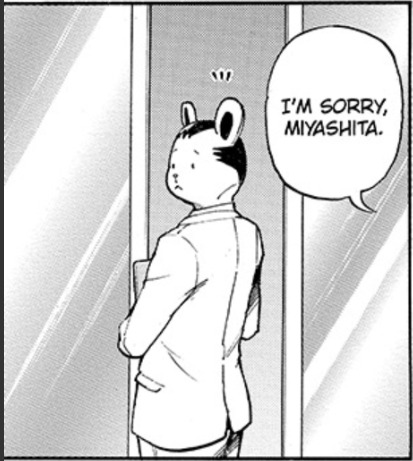
Pictured: a man who was in daily close contact with the leader of the movement and who was at one point in time in possession of a copy of the movement's manifesto. (Chapter 218)
The problem with grabbing everyone in a group, even the most obviously PLF-aligned groups, is that there are always going to be both people who don’t seem to know anything because they’re very good at living double lives and aren’t particularly active on the recruitment front, and people who don’t seem to know anything because they legitimately don’t know anything.
The Gunga Villa is straightforward enough—on paper, it was probably reserved for a business retreat for four months, because you certainly wouldn’t want some random newlywed couple booked for a nice mountain honeymoon recognizing Shigaraki Tomura wandering around. Same story for the employees; the MLA wouldn’t have put the League up at the villa if there was a chance that anyone there would rat them out. So I think we can assume relatively fairly that anyone in the building the day of the conference is solidly implicated, whatever their claims might be otherwise.
Of course, plenty might well try to claim that they were just there for the vacation, or just started work last week and had no idea the place was a nest for conspiracy, but that was where Hawks spent most of his time, and most of the people at the villa presumably fought back against the heroes. It might be a complicated process, matching hero eyewitness testimony to every person there, but you can at least sort of see the path to it.
Other groups, however, are a lot less straightforward. Consider the following categories:
The Liberated Districts
As I discussed earlier, Deika was presumably a high watermark on societal saturation, but Deika still only counted 90% of the population as “Liberation Warriors, lying in wait.” That leaves 10% unaccounted for. So who are those 10%? Are they children?[37] Some children too young to know anything about the PLF, and some old enough to know but not yet old enough to be considered warriors for the cause? Are they instead elderly people, maybe remnants from when the MLA first started to infiltrate the town that have just never had enough close family or social life to get pulled into the Liberation Army by the usual vectors?
By far the worst option is if Trumpet’s 90% accounts for anyone even remotely connected to the MLA—that would mean one out of every ten people in Deika is legitimately completely ignorant of what the powers that be had brought in. How on earth are you supposed to tell those people apart from the other 90% when the heroes sweep in and arrest absolutely everyone? Or are we to believe that the HPSC had time to get in an agent to flash a covert L-sign at everyone in town and they only arrested people who visibly acknowledged it?
These problems only get worse for our hypothetical town that’s 70% PLF. That opens you up to far more people who have only recently started getting drawn in. Consider the disaffected twenty-something whose family has no idea what’s been keeping him out so late in the evenings. The young mother who met the nicest and most convincing people via the daycare, but whose husband is always out of town on business trips so she hasn’t had time to introduce him to anyone. The working parents who just joined up and whose kid, away at hero school, doesn’t know anything—yet.[38]
Evaluating these peoples’ social circles and financial history for other PLF attachments is going to turn up a ludicrous number of false positives unless the Commission can narrow down exactly when and where such people crossed paths with the ideology of Liberation. So many people would have been raised to it, people whose entire lives are suspect, but mistaking even one new recruit for a lifelong loyalist gives you exponentially more avenues to baselessly suspect people—and as established, the Commission just doesn’t have the time to be overly discerning.
Detnerat, Shoowaysha, and Feel Good Inc.
This is another line of attack that seems like it should be a bullseye, but is actually quite the opposite. Detnerat is a business that is run by the leader of the entire movement, yet the fact that not everyone who works there is a member of the MLA is one of the very first things we find out about them! Miyashita was something akin to a personal aide or secretary to Rikiya, someone Rikiya liked well enough that he was on the verge of introducing Miyashita to his other friends—and Miyashita didn’t know the first thing about his boss’s true affiliations. It’s patently obvious from that alone that not everyone at Detnerat is PLF, and it's likely that the numbers of the faithful are even thinner at Curious and Skeptic's outfits, where they're high-ranked executives but, crucially, not actually in charge.
This is, of course, complicated further by the fact that people who work at e.g. a publishing house are probably there because they agree with that publishing house’s politics, whether or not they know what’s going on behind the scenes. Ditto with Detnerat—certainly there would be people there who just needed a job and could charm their way through an interview without an inner passion for the work, but loads of people probably work there because they legitimately believe in the company’s ethos. So how do you tell people who have relatively radical personal politics without having any idea about the terrorism apart from the people who are absolutely PLF/ex-MLA but who are now lying about it because their organization's cover is blown and the response to that is, “Well, time to go back underground!”
The Hearts & Minds Party
Membership of this party would seem to be a good indicator, but using it that way too unquestioningly is also very flawed. This is because the HMP particularly is probably an excellent recruitment tool for the MLA/PLF. The note above about having radical political beliefs but still being ignorant about the planned acts of terror is especially true for the HMP. The Commission cannot just pull the voting records and arrest all of them because plenty of them are going to be totally ignorant of what was really going on with the heart of the party, only joining up because they believed in the kinds of things the HMP was platforming on—less repressive quirk use laws, prison reform, very possibly issues like the abolishment of the legal category “villain” or greater social safety nets. Just because someone votes for those things, doesn’t mean they know about or would support the MLA’s violent extremism or the PLF’s anarchic goals.
So at what level of initiation does the Commission call a cut-off? How long does someone have to have been voting straight-ticket HMP for them to be considered condemned by that association?
Over and over again, the question arises: how did the heroes and the police distinguish the initiated from the uninitiated? And given that Japan’s legal system at least nominally requires that guilt be proven, what are they going to do when huge numbers of those people claim innocence?
The Presupposition of Guilt
Let’s take a few minutes to circle back to what I talked about earlier, the presumption of guilt and how it relates to arrests, convictions, and the perception of arrestees in Japan. This is going to swerve hard back towards real-life Japan issues for a bit, but it is exceptionally relevant when examining what’s likely to happen to the people arrested in the raids, innocent and guilty alike, so thanks in advance for bearing with me.
In Japan, the rate of conviction is extraordinarily high—if you’re in anime fandom and active in social justice circles, you may have seen the tumblr posts about the country’s famed 99.9% conviction rate.[39] There are a range of explanations for this. Defenders argue that, compared to police in many other countries, police in Japan are very cautious and don't move to prosecute unless a case is all but airtight; thus, many who are arrested may well be released without charge if there is even the slightest doubt that the case will hold up in court. One can easily see truth to this by looking at the numbers on how many people are arrested in Japan versus how many are actually charged: Wikipedia notes (albeit without citation) that in the U.S., roughly 42% of arrests in felony cases result in prosecution, while in Japan the figure is only 17.5%.
Conversely, critics note that a major feature of convictions in Japan is the confession, and confessions can be coerced, particularly in the sorts of conditions that those imprisoned in pre-trial detention are kept—no legal representation, no contact with their families, loved ones or employers, no requirement that they be informed about what they’re being charged with, potential weeks upon weeks kept in isolation, sessions of questioning that can extend for most of the day.
There have also been cases in which confessions have been found to be falsified, for example by having the suspect sign a paper and then filling in or altering other details after the fact.
There are some other factors about confessions to be aware of here:
In Japan, it is not legally permissible for a suspect to be convicted solely based on their confession. The constitutional provision in this regard is something called himitsu no bakuro, the “revelation of secret.” The revelation of secret is something in the confession that is factually verifiable and which, at the time of the confession, only the suspect could have known. Common examples are things like the location of a previously undiscovered body or the time and location where a weapon used in the crime was purchased. The majority of verdicts that are overturned in Japan are overturned because of issues with a confession.
Sentencing is also very lenient compared to the U.S., particularly if the suspect was cooperative with police and admitted guilt (seen as showing remorse). Thus you wind up with a situation in which suspects believe that they’ll lose a case if they go to trial (because practically everyone does) and prosecutors—rather more aware of the weaknesses in a case than a confused and vulnerable layman—don’t want to bring a shaky case to trial, and thus both parties are invested in whatever will get the suspect out with a minimum of effort. The result of this is a high number of people released on “suspended prosecution,” which is an admission of guilt, but with a prosecutor's decision to show lenience while still establishing precedent for possible later offenses warranting more severe punishment. This is a particularly common result for first-time offenders, especially in non-violent crimes.
Note that suspended prosecution is not at all the same thing as being released for lack of evidence; a suspect is conceding their guilt by accepting the arrangement. However, many suspects who the police might not be confident in convicting are known to sign confessions and accept the arrangement regardless, because, along with fear for their livelihoods, it’s known that judges tend to view extended time in detention as a sign of guilt. Also too, if admitting guilt is seen as showing remorse, then maintaining one’s innocence is often perceived as a lack of remorse—leading to fears that fighting the charges will result not only in defeat, but also in harsher sentencing!
All of these factors combine into a problem with perception of guilt that feeds on itself endlessly at all levels. Let me use a run-on sentence to summarize: the general public views anyone who is even arrested as probably guilty, because the police are seen as generally only moving on those who are guilty, because police specifically only prosecute those who they can all but prove are guilty, but guilt can be “proven” by a sufficiently detailed confession, and while confessions are required to have some corroborating evidence, they can easily be falsified and may well be offered up with minimal resistance because the suspect is also convinced that judges will only be harsher on them if they put up a fight because suspects also believe that they will be convicted at trial because everyone knows the conviction rate is unbelievably high.
Japan likes to think of itself as a “safe” country, which is in large part why its deeply concerning arrest and detainment procedures have held up repeatedly in court. These things help keep people safe, after all, and who wouldn't want people to be safe?
Returning, then, to the matter of My Hero Academia and the Paranormal Liberation Front mass arrest, I don’t think it’s overstating things to claim that the dehumanization of villains and the glamorization of heroes has probably exacerbated these problems.
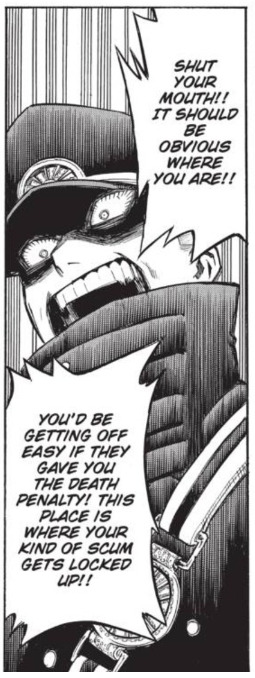
Cruel punishments are illegal under Article 36 of the Japanese constitution? But what if someone really, really deserves it, though? (Chapter 94)
You can see that willingness to shrug off civil rights violations as long as it means safety in the symbol All Might represents, a hero who is there to beat up baddies, not ask questions about why they're being bad. Ditto Tartarus, where the Bad People get put, regardless of whether their Bad really warrants so awful a punishment or whether the severity of such a punishment serves as an effective deterrent.[40]
As to the presupposition of guilt, if a hero thinks they saw someone Doing A Bad, and confidently testifies to that effect, who’s going to doubt them? It’s blunt to the point of headache-inducing that Midoriya Izuku, the boy who will be the greatest hero, who’s treated by the story as if he’s the first person in history to think about “saving” a “villain,” doesn’t even start to think about such a thing until he literally experiences a psychic impression of a five-year-old crying within the heart of Shigaraki Tomura.
At the press conference in Chapter 306, it’s illustrated numerous times that huge portions of society don’t particularly care about Dabi’s accusations. They don’t ask for Hawks to face justice for the murder he openly admits to committing; they don’t ask for apologies for the heroes’ wrongdoings. They ask for heroes to make them feel safe. Even if it means lying to them; even if it means asking Endeavor to go out there and “take down” his firstborn son. People are uneasy about the accusations, certainly, but what they want is not for heroes to take responsibility for their actions, to atone for them, but rather to deny that there’s any truth to the accusations at all.
This is not a society that, in the wake of Gigantomachia’s rampage, is going to be open to the possibility that some people caught up in the mass arrest are legitimately innocent and that everyone, even villains, deserves to be afforded the full extent of their rights.
The Dissolution of the HMP
Speaking of rights, let’s go over one that we can immediately see has been flagrantly violated in the manga compared to the state of real-life Japanese law—the overnight dissolution of the Hearts & Minds Party.
As discussed earlier, it's unlikely that every member is a dyed-in-the-wool terrorist. There are bound to be perfectly innocent people in the country who just so happen to agree with the HMP’s campaign platforms. Now, all of those people are going to turn on the evening news[41] and be blindsided with the news that their political party has just been dissolved and some enormous percentage of its membership arrested. This was not publicized or forewarned; it just happened, in a matter of hours. Do you think those people—people who are members of a party that specifically opposes the current status quo—are just going to nod and say, “Oh, wow, that sucks, but who am I to question the wisdom of the government and its agents? Time to find a new political party, I guess!” Would you?
I can assure you that you wouldn’t, because let me be clear: under current Japanese law, what we’re told happened to the HMP is unbelievably illegal—not only because they were dissolved at all, but particularly the speed with which that dissolution was carried out.
I mentioned earlier, in the section “Japan and Illegal Organizations,” that there were methods by which organizations can be dissolved. Now I’d like to look at that in more detail.
Any organization that’s been flagged as a potential threat—that “terroristic subversive activity” designation—can come under investigation from the Public Security Intelligence Agency. Their recommendations are then passed up for evaluation by a member of the Public Security Examination Commission,[42] who can pass a variety of prohibitions—the bans I mentioned earlier on printing activities, public assembly, and a few others. These prohibitions are issued in periods lasting up to six months, at which point they are re-evaluated and can be dismissed or renewed.
If the Public Security Examination Commission decides that the comparatively soft-pedal restrictions on freedom of the press or freedom of assembly are not sufficient to deter the organization in question from committing terroristic subversive activity continuously/repeatedly in the future, the Commission can elect to order the organization dissolved. This revokes their rights mentioned above entirely, and further stipulates that they liquidate their assets,[42] and that no member of or representative for the organization can take actions in the organization’s interest (e.g. things like opening bank accounts or buying property). The only exception to the latter restriction is a designated representative for the organization who is granted the right to manage its assets in the process of overseeing the dissolution.
Any of the designations above can be appealed, but dissolution is permanent until specifically overturned.
Now, it might well seem that the HMP could be targeted under the “advocating for subversive terroristic activity” criteria, but here’s the problem with that: that criteria is based on the organization engaging in/advocating for such terroristic subversiveness as an organizational activity—that is, the activity in question is a foundational, core aspect of the organization’s endeavors. And I simply don’t think that’s how the HMP operates. To reiterate, I believe they’re a recruitment tool, meant to siphon people into the MLA (later the PLF) proper, but otherwise a perfectly legitimate political party with real political aims, outreach, goals, and so on.
Of course, I can easily see the anger over all the destruction leading the Ministry of Justice to being heavy-handed in its response to the Paranormal Liberation Front and any organization even suspected of being associated with it, of which the HMP is the most prominent. I could also simply be wrong about what the HMP says at their rallies. Regardless of either of those possibilities, however, there is still the matter of the timetable.
There was a period in Japanese history that organizations—political parties especially—could be dissolved on the spot. The Meiji Constitution granted that right to the Minister of Home Affairs, a Cabinet position appointed by the Emperor, and indeed, any number of socialist, communist, or labor-oriented parties were banned and dissolved within scant months of their establishment for their alleged leftist or subversive leanings.[44] The Farmer-Labor Party of 1925 was dissolved three hours after its establishment! So clearly there’s some precedent—or at least, there was. Like many things, the power to summarily dissolve organizations did not survive the Meiji Constitution’s transformation into its modern-day incarnation after World War II.
The Subversive Activities Prevention Act, the same one that lays out the causes for dissolving an organization, also details a legally mandated process by which this dissolution is carried out. Most prominently, organizations cannot just be dissolved with no notice, no chance to defend themselves. Any disposition curtailing an organization's activities, from the bans on their printed material to complete dissolution, is required to be announced both via the government's official gazette[45] and, if the residence of a chief officer or representative of the organization is known, also via written notification. These notifications must be sent at least seven days before the hearing date—a hearing which, further, the organization has the legal right to send agents to in order to present statements and evidence in their own favor, as well as examine the evidence being presented against them.
This clearly did not happen. Bare minimum, Hanabata Koku, as leader of the Hearts & Minds Party, should have had an address the Commission could get ahold of, especially given all the snooping they so obviously must have been doing to unearth the extent of the PLF’s reach.
It’s instructive, in this regard, to look to history. To wit, I’ve said a lot about how gun-shy Japan is to dissolve organizations outright, thanks to its history of governmental repression—but how true is that really? If the government really wanted to, couldn’t it just decide to crack down on something and ride out the controversy? Has it done as much before?
To put all this into proper perspective: no. It hasn’t. The government has invoked the Subversive Activities Prevention Act against a group rather than individuals only once in all the time since the act was passed in 1952.
It was against Aum Shinrikyo, and it didn’t happen until seven months after the subway attacks. Even with nearly unanimous desire to prosecute, even though Aum had been under police surveillance prior to the attacks, even though lawsuits against them were and had been ongoing, meaning at least some measure of investigation was being done openly, it still took seven months to gather the evidence, submit it to the Public Safety Examination Commission, allow Aum their appeal, and enact the ruling. That’s because, in a society ordered by democratic processes, these things take time.[46]
But the HMP? No one who wasn’t a member knew about their affiliation with the League of Villains—much less an underground army!—until Hawks got the word out, and the Hero Public Safety Commission had to be rigorously careful that news of their investigations not leak because they knew they had their own moles to deal with. So far as we know, the Hearts & Minds Party remained a legit organization right up until the day of the raid. It is functionally impossible under current Japanese law for them to have been dissolved in the scant few hours between the commencement of the raid and the attack on Tartarus in which the two guards mention the dissolution.
Even if the relevant agency in the Ministry of Justice submitted their paperwork the absolute minimum of time in advance, there is no way the HMP and Trumpet—and therefore Re-Destro and the League and everyone else—shouldn’t have known that the government was moving against them. The only answer is that the Ministry of Justice was evading its legal obligation to notify both the public[47] and the HMP itself, or that the Japanese government, in the wake of the Advent of the Exceptional, throttled back on constitutionally guaranteed freedoms exactly the way human rights activists today are always warning about.
Stigma and Recidivism
In the same way that In Custody is not (or shouldn't be) a magic status effect preventing villains from escaping from police, In Jail is not an endgame state. Most people in prison are not there for life (or death) sentences, particularly not in Japan. Even if the majority of the PLF gets stuck in prison for decades, there will, eventually, be an “after” for them. So what happens “after”?
Well, like many countries, Japan has made efforts in the modern day to offer training classes and parole officers to help reacclimate ex-convicts into society once they’ve done their time, but it remains a difficult process, and the country has a relatively high recidivism rate. Given the stigma against criminals—present to a degree in all countries, but particularly exacerbated in Japan—it is frequently difficult for released prisoners to find stable housing or employment—both key factors helping to prevent recidivism.
So does MHA’s Japan have similar programs? Well, it’s hard to say, given that the only prison we’ve actually seen is Tartarus, which is obviously a poor model to base a lot of judgement on—save, of course, that any country that could develop a place like Tartarus is a country with an appalling deficit of care for criminals’ human rights, which doesn’t bode well for their other prisons.
Speaking of things that don’t bode well, though, we have two obvious examples in the canon of how convicted criminals fare: both Gentle Criminal and Twice are, it’s suggested, prosecuted for their foundational fuck-ups—Tobita for obstructing public duties[48] and Jin for his traffic infraction. It’s unclear whether they went to prison or not—given the relative lenience shown to first-time offenders, I’m inclined to think probably not—but even given these very mild offenses, their lives were turned completely upside-down, and no apparent efforts were made to help them through chaotic periods that saw Tobita apparently disowned and Jin losing his job.
Consider the harsh reactions they garnered and the apparent lack of assistance from any social structure despite the relative mildness of their wrongs, and things start to look very bad indeed for the PLF. Will there be any steps taken at all to deradicalize them? Does taking such steps seem likely, given what we've seen of MHA’s legal and carceral systems thus far? Further, if there is no plan for deradicalization, how exactly do the heroes propose to stop this from happening again (and again, and again and again and again)?
Here’s another alarming thought: what will be done with the children? There’s no way around the fact that the MLA, and therefore the PLF, included children[49]—and I don’t mean it in the tumblr sense of describing a sixteen-year-old as “a literal child,” though there would be some of those, too. No, I mean the grade-schoolers, the toddlers, the babies. Maybe some of them will have non-PLF family they could hypothetically go to, but as I have written about in the past, there’s a very real bias about orphans and other children separated from their parents in Japan, and even blood ties are not always enough to overcome that stigma. Alternative care is in a woefully sorry state as it is in Japan, and this would only be compounded for PLF kids—damned first for their criminal associations and again for being the children society doesn’t want.
However many thousands of them that may be.[50]
So here again, a question recurs. Where before it was, “How do you tell the guilty from the innocent?” here it’s, “How do you stop the societal backlash from ruining countless peoples’ lives both now and for decades into the future?” What kind of stigma will all these people—rank and file who come out of prison deradicalized and ready to rejoin society, children who were too young to understand why heroes took their parents away, ignorant family and friends who just lost loved ones to a massive government sweep, innocents swept up in the net and imprisoned for crimes they didn't commit—going to be facing? How long, then, before that stigma sees them radicalized in turn?
You cannot sweep 115,000 people under the rug and not expect there to be a stain—and given the narrative themes of the rest of My Hero Academia thus far, it’s absurd to think that’s even an option.
Next time: how scrapping the ex-MLA portions of the PLF undermines MHA's narrative integrity.
-----------------------------------------------------
Footnotes (Part Three)
[26] And in the legal sense, murder in the second degree.
[27] For the monstrous callousness of his comments in that conversation, said guard is immediately murdered by karma All For One. I very much hope we ever get Shishikura’s opinion on this, because I’m pretty sure the guard was his dad.
[28] Who, in Chapter 35 of that series, leads a group of police firing rubber bullets at an active villain, emphasizing that the police are trained in non-lethal tactics, and any escalation from that is not to be taken lightly.
[29] Indeed, you could make a fair argument that that’s exactly why the manga included the Noumu to begin with, though the lower-tier ones wind up captured as often as not.
[30] Vigilantes, Chapter 74.
[31] This sidesteps the matter of “rescue heroes,” those who focus on disaster response and evacuation. Note, however, that this is not a categorization that pits those heroes against non-quirk-abusing civilians. Non-quirk-abusing civilians are criminals for police to deal with, not heroes of any stripe.
[32] This would be in keeping with real-world de-escalation tactics. So for e.g. the purse-snatcher in Chapter 1, where we’re told he didn’t use his quirk until he’d been backed into a corner, I would bet that Kamuy Woods or whoever confronted the thief didn’t start actually using their quirk on the man until he went into giant mode. That is anyway a kinder interpretation than noting that he was a heteromorph and would have been using his quirk automatically just by virtue of existing in public.
[33] After digging him out from under the stairway it had a teenager drop on top of him, I mean. Did he even have much of a chance to use Incite at the villa, do you think?
[34] Though given that literally every member of the MLA we’ve met is addressed solely by their code name, I don’t for a second believe he could have gotten real names out of everyone he talked to.
[35] And judges virtually always grant warrants. It’s that presumption of guilt thing again.
[36] But that panel of the normally taciturn Edgeshot shouting at a bunch of high schoolers not to let a single person escape is pretty damn telling too.
[37] 14% of the Japanese populace is under 14 years old, so that’s not too far off, though I’d be inclined to think, based on everything we know about them, that the MLA was having more kids than Japan at large, not fewer.
[38] This should have been Uraraka, by the way.
[39] An exaggeration, but only by a handful of tenths of a percentage point.
[40] Though until recently, it’s served as a great check on recidivism, clearly.
[41] You know, assuming that they weren't all arrested in the middle of their workday or cleaning house or going to university or what have you.
[42] Both are among the agencies that make up the Ministry of Justice. I’d be willing to bet that, in-universe, the Hero Public Safety Commission is also under the Ministry of Justice umbrella.
[43] The funds are then remitted to the National Treasury.
[44] Though one thing to note for our current context is that, even when those parties were dissolved, it did not automatically follow that any duly elected representatives were expelled from office. Unless there was legal reason to remove them, any elected officials were simply rendered “Independents” rather than being affiliated with a political party. The constitution stipulates that Diet members can only be expelled by a two-thirds majority vote, though in such circumstances, most politicians choose to step down from their positions before it comes to such drastic measures.
[45] A newspaper or other bulletin officially authorized by the government to publish public and legal notices—in Japan these days, it’s an online site/newsletter.
[46] And they’re often still controversial with progressive activists, as the invocation against Aum was even contemporaneously! Incidentally, Aum’s dissolution lasted for a mere two years before the government panel ultimately declined to make it permanent.
[47] And if you don’t think the HMP had someone watching the official Japanese government website, you’re clearly not taking them seriously.
[48] And possibly more besides; the dialogue in question trails off in a way that suggests that the obstruction charge is only the first in a list.
[49] Start at Yotsubashi Rikiya being inducted when he was still in schoolboy shorts and continue right on up through the people we see in school uniforms in various mass battle scenes involving the MLA rank and file.
[50] And it easily could be thousands. If, say, even 10% of the PLF are minors, that’d be well over 10,000 kids, and thus we’re right back to overcrowding problems, except this time they’re about Japan’s child services programs, and the last thing they need is a new group of kids that numbers a full third of the number of children already in their care in real-life Japan. Naturally, the number only climbs if you think Re-Destro wasn’t counting kids in his initial reckoning of the MLA’s membership.
#bnha analysis#bnha meta#paranormal liberation front#meta liberation army#boku no hero academia#my hero academia#bnha#bnha spoilers#my writing#plf arrests#stillness has salt
76 notes
·
View notes
Photo

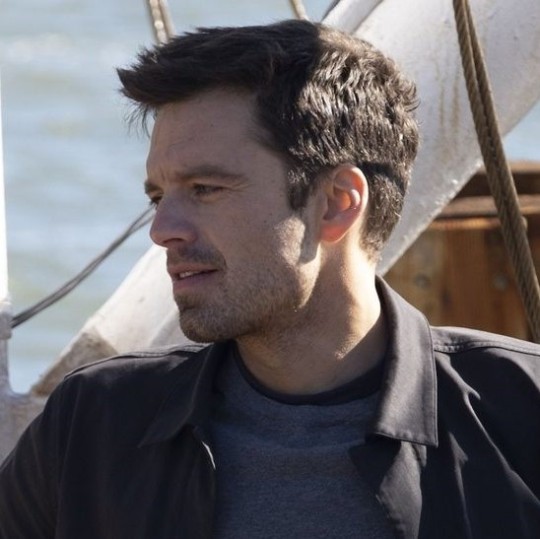


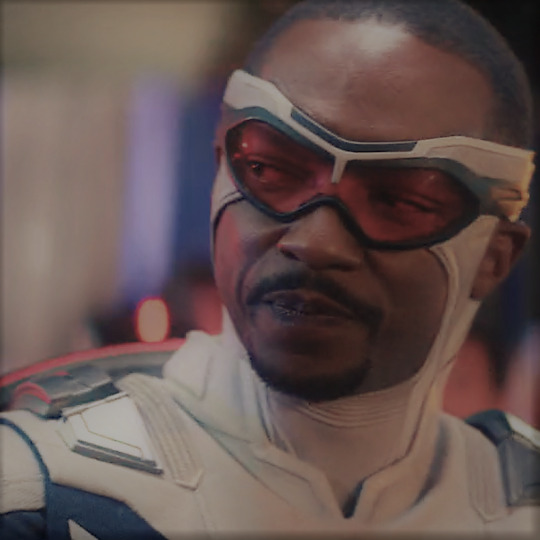
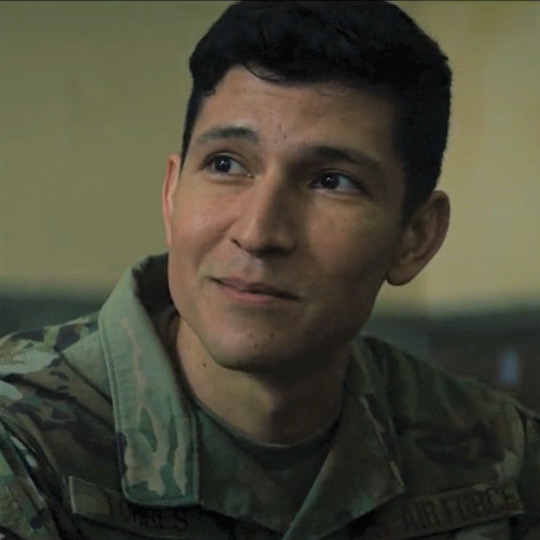


Never a Gull Moment
Fandom: The Falcon and the Winter Soldier
Pairing: Sam Wilson/Bucky Barnes
Rating: T
Word Count: 3523
For @yavannie, who wanted Sam to either gain new powers or carry Bucky through the air. Spoiler, I went with both. Hope you enjoy!
Summary:
Sam’s had an intense first week as Captain America. The perfect opportunity for a break arises when Joaquín contacts him, offering new programming for his suit. All he needs to test the tech are the beach, birds, and one uncooperative bonehead Sam didn’t manage to leave behind in New York.
If there’s one skill Sam’s hoping to adopt from his predecessor—Steve, not Walker (sweet Jesus, not Walker)—it’s the ability to end a conversation with a humble handwave before it can even begin. Steve always had that in the bag. Leading with the wrist in a flick of the hand that came across as both sheepish and respectful. Like he’d love to stop and talk with that fan or this journalist but he was just too busy. And not rude busy, busy with a quiet nobility. Anyway, it all came across in the wave.
Sam hasn’t nailed the wave.
Four days after the GRC vote-that-wasn’t, he’s still in New York, bouncing between TV appearances; everybody wants a piece of the new Cap. Sam wishes they asked a little more about his opinions on compassion for the displaced, as well as those who survived the Snap to form new, functional communities, and less about the look of his new suit, but isn’t it always a battle between style and substance? At least people are listening. To everything except the look Sam knows he has in his eyes, the one that says this debut has been a lot and he’s longing for home.
He knows he has to nail this aspect of being Captain America too. Unfortunately, chuckling amiably with morning show hosts isn’t doing a hell of a lot to distract him from what it took to get him here. There are seconds where his attention wavers—he’ll be nodding along to whatever someone’s saying, or letting his gaze follow a bike courier down the street instead of staying trained on the camera the roving reporter has set up on the sidewalk—and that’s when Karli hurtles into his mind. He feels her desperate blows vibrating the shield, the weight of her body in his arms, in her death.
He can’t keep sitting behind desks or posing impressively and trying to answer the hard questions (on the rare occasion they’re asked) after he’s told people he’s not the expert. When Torres calls up, it’s the close-enough-to-official reason Sam’s been waiting for to step back and do something that actually feels useful.
Bucky, who’s been skulking behind the scenes, somehow never pulled into interviews (if he knows the deferring wave and he’s been doing it just outside Sam’s sightline all week, Sam’s gonna kill him), sticks with him. They head south to meet Torres, and at least that feels like the right direction. Homeward bound. Of course, they stop a handful of states before Louisiana and hug the east coast, but it’s an improvement. They meet Torres at… the beach.
He’s got his foot propped in the open doorframe of a Humvee, giving Sam and Bucky a big, eager, whole-arm wave as they pull up. Not like they’re gonna miss him; Torres is in the only vehicle parked halfway down an unpaved road. Sand dunes climb steep and high just feet from his front bumper, an informal path cutting between the dunes and leading to the water, though Sam can’t see that from this vantage.
Torres’s hand is somehow already grasping Sam’s in a pumping, congratulatory shake before he’s fully out of the car. Sam hears Bucky’s soft snort of suppressed laughter and shoots him a look across the seats. Bucky raises his palms, but Sam spots his smirk before they’re both slamming their doors and stretching their legs after the drive.
“Traffic?” Torres asks brightly.
“Nah,” Bucky answers, coming around the back of their ride. “Sam just drives slower than my grandmother and she—”
“Died on the Titanic?” Sam guesses dryly.
Bucky’s flat stare could be saying a lot of things, or nothing. Sam feels as if he’s been a student of the language of Bucky’s stare for a while now, but his comprehension is still rudimentary. Pop that asshole in a sanctuary for rehabilitated brain-washees, have somebody study his behaviour like Jane Goodall studies chimpanzees, and they might get some answers. The idea starts as something funny Sam almost shares, but then he imagines handfeeding Bucky a banana and it gets weird. He keeps his mouth shut.
“Or she got the cryo treatment too and she’s kickin’ around someplace, speakin’ Russian and makin’ headshots.”
“Come on, man, Hydra jokes about your own grandmother?” Sam scoffs. “That’s not even a little bit funny.”
Torres’s expression is like a kid watching a wrestling match on TV—awed, alarmed, reluctant to question what’s real because he’s just enjoying the show.
Bucky cracks a slow smile and Sam rolls his eyes, slapping Torres’s shoulder to get him to head towards the Humvee and the reason they’re here.
“Nana woulda thought it was funny,” Bucky assures them.
“Nana?”
“Lemme guess… You called your aunt ‘TT,’ so your grandmother’s probably… ‘GG,’ am I right?”
Sam glares at him (because his guess is correct and he’s a pain in the ass) and turns fully to Torres as he opens the back, revealing a large case.
“You were vague on the phone,” Sam recalls, watching Torres tug the case close before undoing the clasps. Bucky leans against the vehicle as he observes, dark pants picking up a swipe of road dust from the dirty taillight. “Something about an update for the suit?”
“Right,” Torres agrees.
He throws the case open to reveal the wings Sam gifted him. They’ve been repaired and Sam automatically strokes a hand over the gleaming, extended metal. If Torres did this himself, he sure worked fast.
“That duffle bag wasn’t good enough for you?” Sam asks jokingly, remembering his gear broken and jumbled, fit to be dragged out with the trash.
“They’re kind my prized possession,” Torres admits. “I thought they deserved to be kept nice.”
“You might even wanna put ’em on sometime.”
“I’m working up to that.” Torres laughs. “I wanted to make sure they were in working order before I jumped off a building.”
“Or out of the back of a plane without a parachute, right, Buck?” Sam asks, smacking the back of his hand into Bucky’s chest.
“I was fine,” Bucky insists.
“Sure you were. We can watch the footage again. I’m up for that.”
“Just let the man finish.”
Torres grants Bucky a wide smile in thanks.
“Yeah,” he picks up, “so I was fixing them, working on the wiring, and when I got the electronics running smoothly again, I started thinking about Redwing—”
“May he rest in pieces,” Bucky contributes.
“Uncalled for,” Sam complains.
“I replaced it, didn’t I?”
“The Wakandans replaced it.”
“As a favour to me.”
Torres’s gaze dances between them until Sam motions for him to continue.
“About Redwing,” Torres goes on enthusiastically. “The sophistication of the relationship between you, how intuitive the tech was. How Redwing understood not just simply-stated commands, but a more conversational approach, interpreting your intentions.”
“Finally, a little Redwing appreciation,” Sam says. He crosses his arms and gives Bucky a meaningful look.
“But what if it was a real bird?” Torres blurts.
Most of a minute passes as Sam stares at Torres’s excited expression.
“I think I might get where Torres is going with this,” Bucky says.
Sam holds up a hand to pause him. He could make a guess at it too, but there’s no need for that. They have the source of whatever alterations have been made right here.
“In your own words, Joaquín,” Sam encourages.
“Well,” he begins, one palm braced in the bed of the Humvee as he leans over the case with unconscious protectiveness, “you know I’ve kinda been itching to get my hands on the wings for a long time.”
“Yeah.” Sam laughs, remembering having to practically slap Torres’s hands away from the jetpack in Tunisia.
“Since you gave them to me a couple weeks ago, I’ve been tinkering, like I said, and I had this idea. Now,” he warns, raising both hands in caution, “this might be either really obvious or really disrespectful to the whole concept of the Falcon, but I started wondering if it’d be possible for the person wearing the wings to talk to nearby birds. Use them like a resource, like with Redwing.”
“Black Panther dresses like a cat with Vibranium claws.”
“Spider-Man has webs,” Bucky adds.
“Right,” Sam agrees, nodding to him before looking back to Torres. “I don’t think it’s disrespectful to lean into the gimmick if it’s amplifying your abilities.”
“Awesome,” Torres pronounces.
“I assume you went further than just wondering about it?”
Torres gives them a modest shrug.
“I know a guy who knows an ornithologist.”
“Bird scientist,” Bucky translates.
Turning his head, Sam glances at Bucky with a no shit look.
“Thanks,” he says insincerely.
“You’re welcome.”
“Long story short,” Torres pipes up, “she got me access to a catalogue of bird calls and the scientific consensus on what they all mean. I patched that info into the suit and, hopefully, it’s something that could be used, uh, on the fly. Sorry, I was trying to think of another way to say that.”
“So my suit would be able to communicate with birds?” Sam checks. “Automatically?”
“Yeah, it would assess your surroundings the same way Redwing does already, but scanning for birds, identifying what kind they are, and having the interpretation of their calls at the ready if needed.”
“What sort of information would I be gaining with this tech?”
“Stuff like… are they feeling threatened or disturbed? Does something feel off about their environment that has something to do with somebody you’re maybe chasing?”
“Mating rituals,” Bucky says.
“How is being able to recognize mating rituals going to help me?” Sam demands.
“You never know.”
“You brought your suit, right?” Torres wants to know. Apparently, he’s not going to bother engaging with Bucky’s nonsense. “It won’t take long for me to install the new software.”
“It’s in the back,” Sam assures him, jerking a thumb towards the other vehicle.
“Great!”
“But just the bird calls. This suit is brand new. No tinkering.”
“No tinkering,” Torres swears.
He sets up his impromptu workshop in the back seat, next to the suit. Sam has to admit to himself that Torres’s reverential expression as he handles the Captain America suit is pretty flattering. He watches the progress until Torres sits back, stating it’ll just be a few minutes for the new programming to be assimilated.
“Why the beach?” Sam asks while they wait.
“I was inspired by some shaky, far-away footage of you in New York. You did, uh, kind of a nosedive into the river there, so I thought maybe you’d be interested in testing your suit’s maneuverability in water at the same time as we did a trial with the bird calls.”
“Are we running a drill or something?” Bucky wonders.
“That’s a good idea,” Torres says immediately. “A scenario to use both the calls and the water.”
“You got something in mind?”
Sam isn’t the one who asks because he can see from Torres’s face that he does. Fortunately, he is the one who gets to laugh when the Lieutenant squints consideringly at Bucky and asks, “How long can you hold your breath?”
—
The last Sam sees of Bucky, he’s taking off his shirt.
“Oh, entire jacket this time?” Torres asked when Bucky took that off first.
After that, it was his shoes and socks, then his t-shirt, and this whole Bucky stripping thing isn’t so much a last look as something that Sam has to stand there witnessing for a while. He’s already in the Cap suit and, seriously, Bucky could’ve changed at the same time. Then, he would’ve been ready to go without making Sam and Torres wait around. But Sam wouldn’t have gotten to see him undress.
“Hurry it up, man.” His voice is a little off because, at the same time, he’s thinking, Please don’t take your pants off.
“If you’re making me play a drowning victim, I can at least not be getting weighed down,” Bucky argues. “This is to help you, right? Quit complaining.”
Finally, he stalks away, mounting the dune in black jeans and a half-assed scowl and disappearing over the top. The plan is for him to swim out, then duck under the water when Torres tells him to (the guy’s brought along waterproof earpieces for the purpose). Next, Sam will fly up and search for the ‘victim,’ relying solely on input from the seagulls wheeling lazily overhead. It’s a good exercise Torres has cooked up.
Sam hands the shield off to Torres for safekeeping before the Lieutenant heads to the beach. The shield won’t be necessary for this and there’s no way in hell Sam’s leaving it in the car. Besides, it’s kinda funny how wide Torres’s eyes go when Sam offers it up. Even bigger reaction than leaving him the wings, though this he doesn’t get to keep.
“On my signal,” Torres restates.
Sam gives him a sharp nod.
Once he’s alone, he paces between the vehicles, eager to kick off the ground. He hasn’t had an opportunity to just enjoy himself in the new suit yet. Leading up to the confrontation with the Flag-Smashers (and Georges Batroc, that fists-of-steel bastard), he was in training mode, focused and determined. In the media-heavy days that followed, he conceded to a few stunts for the camera. Those hadn’t been purely fun though; they were actually something Sam had to think quick and hard about, ultimately deciding that it wasn’t just performing on command but rather giving the public a lighthearted look at their new Captain America. Testing new tech with Bucky, Torres, and a bunch of seagulls? That seems like it’ll actually be a good time.
The instant Torres’s voice in Sam’s ear says, “Bucky’s under,” he unfurls the wings and sails up over the crest of the dune.
It’s not the warmest day and the greenish-blue water’s choppy near the shore, but there is a surprising smattering of people along a quarter mile of beach. Must be locals, Sam guesses, trekking down to the water from nearby houses. That would explain the lack of other cars where he parked. The people aren’t that close or that bothered by his sudden appearance overhead. Startled, sure, but after they’ve identified him (he sees a few hands lifted to foreheads to block out the sun so they can get a good look), he gets to return a couple big waves. Besides that, nobody’s getting to their feet to pound sand and swarm Torres, who’s conspicuously there with Sam—he is holding the shield, after all. Pretty typical. The bigger the crowd, the greater the chance of people scrambling for his attention and/or whipping out their phones to film him. This group seems satisfied with watching Captain America hanging out at their beach on his downtime and Sam appreciates them for that.
“No scanning the water,” Torres says in his ear. Sam laughs.
“I’m not, just assessing our audience here.”
“Is this a bad spot? I didn’t think anybody’d be around when I sent you my location, but—”
“It’s fine. Don’t worry. Did anybody ask you what was up when Bucky waded out into the water?”
“Nah. If they were wondering, they probably aren’t anymore.”
“Glad I won’t have to compete with a lifeguard to rescue him,” Sam jokes.
He hears Torres’s short laugh of agreement before focusing. Not on the water at all, but the birds. Those down on the sand are squawking for food, comfortable enough with these people to complain loudly in the hopes of being fed.
Sam’s sudden swoops scatter the gulls in the air, so he tries easier circles, mimicking their movements to hover high above the beach. Soon enough—these guys either have bad short-term memories or no patience—they start communicating with each other. The new programming Torres has uploaded to his suit signals to Sam that the birds are aware of a disturbance in the water. He gets a target on his goggles’ imaging and dives.
Sucking in a deep breath, Sam crashes into the murky water no more than a hundred yards out. The drop-off is dramatic enough for him to not complete a faceplant into a shallow bottom. Bucky’s treading water a couple body-lengths down, but he wrecks his form to offer Sam a raised middle finger in greeting. Sam’s wings retract as he grabs Bucky’s wrist to haul him to the surface.
They breathe, bobbing in place.
“Thought you’d be faster,” Bucky says.
“You didn’t drown, did you?” Sam points out. “Come on.”
He catches hold of Bucky’s hand and shoots out of the water, wings opening in the air to carry him once the thruster’s done its work. But Bucky squirms below him, their wet grip twisting precariously. Water runs from his sopping jeans.
“What the hell are you doing?” Sam asks.
“I don’t want to be carried to shore!”
“Why?”
“Because dangling this high above the ground feels a little weird to me! Not all of us do this every day!”
“I guess we could run the exercise again.”
“Fine. Let’s do that. Just drop me.”
Sam rewards Bucky’s melodrama by abruptly releasing his grip. Hey, that’s what the idiot asked for, and if he can fall out of a plane to the forest floor, he can plunge into water. It’s not like Sam’s up at aircraft cruising altitude, just high enough to make Torres look like a little action figure army man, standing on the sand in his fatigues.
“Running it again?” Torres wants to know.
“Yep,” Sam tells him, accelerating away from the shore. “Just giving that dumbass time to swim to a new spot.”
“Even though he can’t reply while he’s underwater… you know he can hear you in the comms, right?”
“Oh yeah.”
When Torres lets him know that Bucky’s gone under a second time, they start the drill again. Once more, Sam does a gliding approach to the seagulls. Once more, they go quiet before filling the air with their screaming, overlapping calls. Once more, Sam finds Bucky. He knows he’s quicker this time, so he’s expecting an acknowledgement of that when he contracts the wings, straightens his body, and plummets into the water feetfirst next to where Bucky’s floating below the surface.
Instead of an appreciative nod, an outstretched hand, or even a thumbs up, Bucky darts away from him. Is he trying not to get rescued? Now he’s just fucking up the exercise. Only, Sam can’t even berate him, because he’s still under too, holding his breath as he swims after Bucky. He uses the jetpack for assistance, but Bucky’s a fast swimmer, legs kicking just ahead of Sam. Goddamn human shark.
Because he is not an idiot, Sam surfaces to catch his breath, leaving Bucky somewhere below.
“There a problem?” Torres asks.
“Only with Bucky’s idea of teamwork.”
“Get him like a bird would!”
“Is that a real suggestion?” Sam asks, rising and falling as a small wave swells under him, rolling towards the shore.
“Really, Sam! You know, like how birds hunt fish.” Back on the beach, he makes a sharp, downward gesture with his arm that has Sam chuckling. He gets what Torres means though.
“Alright.”
Sam goes from water to air, then, alerted by a trio of seagulls taking annoyed flight from the surface of the water, goes into a steep dive. Nabbing the swimmer from above is the trick, he learns, when the swimmer is being intentionally uncooperative with the rescue attempt. Bucky might be quick when he knows Sam’s behind him, but when he drops down on him, there’s nowhere Bucky can go. Sam wraps his arms around Bucky’s bare chest from behind and lugs him up for air.
The first thing Bucky says is, “You took even longer that time.”
Frustrated, Sam splashes the back of his head, but when Bucky strokes his arms out, rotating to face him, he’s smiling.
“You messed it up,” Sam accuses. He rubs a hand across his goggles to smear the water droplets off.
“Don’t tell me you didn’t have fun.”
Sam narrows his eyes before a laugh bursts out of him. He can’t help it; it’s the pressure he’s been under, so much internal conflict, suddenly drawn out with the current. Yeah, Bucky was slightly uncooperative, but that’s nothing unusual. Swimming ahead like he was going for a gold medal or forcing Sam to plunge deep after him, the two of them suspended like the goddamn Shape of Water before Sam towed him to the surface—either way, Bucky definitely gave him distinct scenarios to work with. Sam can’t say he doesn’t feel more comfortable now that he’s had some practice. More comfortable with his wings in the water, with working with his feathered allies. With Bucky.
“Still don’t want a lift?” Sam checks.
Bucky’s expression hardens and Sam backs off with a laugh.
“See you on the shore,” Bucky states firmly.
“Alright. Get doggy-paddlin’, White Wolf.”
Sam feels Bucky’s hand shoot out to seize his ankle in retaliation as he launches out of the water, but he’s too slow. Sam’s wings fan wide as he flies up, up, up with the birds.
#my writing#tfatws#The Falcon and the Winter Soldier#CAPTAIN AMERICA AND THE WINTER SOLDIER#Sam Wilson#Bucky Barnes#Joaquin Torres#sambucky#Sam Wilson x Bucky Barnes
44 notes
·
View notes
Note
I have a question I hope you don't mind me asking, since Gabriel Agreste is coming out tomorrow and we'll likely get something regarding the sentimonster theory, I was wondering how would you write the whole sentimonster Adrien thing?
Like I know you said it won't be in your fics if it does turn out to be Canon but I'm just curious how you would write it. once again you don't have to answer this and it's completely understandable if you don't
So this is kinda complicated because, to do it right, I'd have to rewrite things from scratch.
Senti!Adrien should be foreshadowed much earlier, and have less plot holes.
We need more direct info on how Sentimonsters work and if they're sapient. Give us a way to tell if things like the Sentibug incident are supposed to be "okay she was nice but is ultimately just a Magic Construct", or if we should be going "holy shit Nathalie fucking killed a girl!!!!". Sure they're sentient but are they Sapient? Maybe even complicated ones like Sentibug aren't, but if you make a Sentimonster to "act as Human as possible" and it lives for years it could begin to gain sapience.
Because seriously. The Peacock being able to casually create fully sapient life is bullshit. Maybe I'm just too into fma but creating life should not be that goddamn easy no matter what method you use!!!
I think a way to help with highlighting the difference could be utilizing the fact that there are two AI characters! Highlighting how Aeon and Markov are, in fact, people rather than programs despite coming from programming could be good here! Instead, we have them using Markov to explain equivalent exchange of "by making him a real person, you'd take personhood away from someone else". So just. Lean into it more. Yes, Markov is a real person from an artificial source! That's possible! And interesting! And liken this to Sentimonsters later!
Now here's where plotholes and potential foreshadowing can come in!
Adrien being able to disobey what Gabriel says! Have Adrien do more rules lawyering here! Like full on Fae Bullshit of twisting Gabriel's words and "wel technically-" arguments. He's never directly disobeying, not really. Right? (And yes this could still be subtle because people in strict or outright abusive households do these kind of mental gymnastics to be able to do what they want and try to talk their way out of trouble, even if they also know it won't work and they're basically doing a "ask for forgivenss instead of permission" thing").
I thini /maybe/ you could keep Gorizilla, despite the plot hole here, if you use that rules lawyering. Gabriel, knowing Adrien is a Sentimonster, asks Adrien directly about Chat Noir. Adrien bends the wording to be all "well I'm not(for now)". With Gabriel knowing that Adrien is slippery like that and deciding to find out a sneakier way.
Episodes like Chat Blanc and Ephemeral would have to be different entirely because if Adrien is a Sentimonster then Gabriel doesn't need to Akumatize him to get him to obey! He could still do so as Akumatization would give him new powers and all. But Adrien shouldn't be able to resist at all through BOTH BEING A SENTIMONSTER AND AKUMATIZATION.
There also needs to be a reason why neither Peacock User can tell that Chat Noir is a Sentimonster. Supposedly they can only sense the Amok but.... That needs to be more clear. The only time it was brought up was Feast, but I explained why that was confusing.
Also, if Adrien is a Sentimonster and the whole "maintaining a Sentimonster on a broken Peacock Miraculous" thing is why Emilie is in a coma.... I feel like that should be addressed. Mainly, I could see Gabriel blaming Adrien for this. But that doesn't seem to be a factor at all.
And ultimately. In the end. After things are revealed and all that. I don't want this to be a way to handwave Gabriel being a shitty parent as part of the Sentimonster thing. All blame is put on him for being a dick, not stuff about Sentimonsters.
10 notes
·
View notes
Text
So I did start watching Stargirl last night, and it was both exactly what I expected and also very different from what I expected.
It’s got brightly-colored superhero costumes. It’s got codenames and secret identities and self-styled “Injustice” characters. It’s got Pat Dugan running around in his full mini-mecha suit that he built from scratch. It has, in short, all the goofy-yet-indelible parts of comicbooks that so many adaptations try to strip out of them in the name of “realism” and “seriousness” and even “depth”. It’s not embarrassed to be a comicbook, which is refreshing.
However it is also a lot darker than I was expecting. Real “darker”, not just unnecessary profanity and a lot of sex to say “See, we’re so grown up!” which just winds up looking immature. The exposure and constant public shaming of Yolanda is unsettling, all the moreso because it is sadly very believable. A child is killed by a supervillain in the third episode, and he’s dead dead with no “Only in a coma” or “we trapped him in suspended animation” comicbook handwave to avoid the final result. Many works with teen superheroes have the grownup characters say “This isn’t a game! It’s serious!” to the teen heroes, but because the works are kid-focused there’s very little actual danger to them or other children. Here I believe it.
Getting the comicbook kitsch combined with this type of drama is not something I think I’ve seen before. So far it’s working.
Apart from my usual litany of minor quibbles (You know me), my only real complaint so far is the way Courtney is just picking random people at school to give superpowers and abduct into her crusade. She sees that Yolanda is a social outcast and that she has boxing skills, so without feeling her out or knowing anything about her she reveals her identity and makes her the new Wildcat. She’s met Rick like once, but again reveals herself and makes him the new Hourman once she learns he’s the son of the original. This is a little too much “kid show” where the main characters are just picked randomly and given superpowers, and given how serious other aspects are portrayed I find it a little ridiculous.
Then again, maybe this is deliberate. Setting up for it to fall apart and for Courtney to realize that it’s ‘not a game’ and she can’t just expose herself to all of her friends or draft any other teenager into this dangerous conflict. I suppose I’ll have to keep watching to find out.
9 notes
·
View notes
Text
The Rebel Princess - Final Review (SPOILERS)
I tend to be quite critical right after I watch the finale of a drama since emotions are high, so my review might be a little harsh. My feelings might simmer over the next few days while I digest things, but for now, I’ll break down my impressions into 3 parts: The “Good”, The “Didn’t Make Sense”, and The “Could Have Been Better”.
The “Good”
The final scene. That’s the first immediate good thing that comes to mind. That’s probably the only good thing tbh. To be clear, these last 5 episodes weren’t bad. Everyone got their comeuppance, our leads live happily ever after, and Wang Su finally sees the light and goes against Daddy Wang by saving baby Jing’er. But, there were quite a number of things that frustrated me while watching.
I will note one other good thing, which is that we got to see our favourite OTP act out a show to misdirect the rebels in hiding and lure them out. We finally get to see our leads collaborating and putting their smarts together! But, this meant that they had to separate again for the millionth time in this drama. And even though it was just an act, the fake confrontation scene between them still stung. As a trashy romantic, I wish we got to see more scenes of them together, especially towards the end of the drama.
The “Didn’t Make Sense”
But because we finally get to see them work together, I wished we got to see more scenes with them plotting together. This is the first time that they’re working together to uncover a political plot, and yet it’s only relegated to one short conversation scene between them after Awu returns from meeting with her brother who refuses to tell her who’s behind the scenes pulling the ropes.
ALSO, the drama never really addressed how Xiao Qi kind of handwaved Zitan’s involvement in the Neem Yu Shan plot. How did Xiao Qi go from “I need to have vengeance for my betrayed fallen soldiers” to “I need to help uncover the plot against the crown”. It’s kind of implied that Awu might have already told Xiao Qi about the truth before Song Huaien does, but the drama never makes that clear because we never see that scene if there was one. If Xiao Qi learns about the truth from Song Huaien first, does he then talk about to Awu? Again, we don’t know because it’s never shown to us. Instead, right after we see him learn about it from Huaien, it then immediately cuts to the confrontation scene with Awu. BUT, since this confrontation scene was revealed to be planned by them, it means that they’ve already discussed the Zitan problem in private beforehand, and Xiao Qi already knows that Awu knows, but we never see this conversation. It’s also revealed that they’ve long been suspicious of Huaien, but when did this suspicion start? Again, we don’t see this conversation. We just have to guess.
This is just one example of how these last 5 episodes made it VERY obvious where scenes were deleted. A lot of scenes were cut abruptly where one scene would suddenly cut to the next, and you kind of had to infer what happened between those scenes. Things still made sense and you could still follow along, but you could tell that they cut out scenes that would have helped flesh things out and make the transitions smoother.
Villains: Nearly every villain in the drama (Jin’er, Zitan, and Song Huaien) turned back into their “good” old selves again during their downfall. And because of this, it made the finale of the drama pretty underwhelming. Jin’er expressed how she misses the old days to Awu and calls Awu one of the most important people in her life, Zitan sees the light and promises to yield the throne to his nephew and face punishment for his actions, and Song Huaien uses his last dying breath to ask Xiao Qi to take him back to Ning Shuo and how he doesn’t want to be in the capital anymore (when he literally has an arrow to the heart while sitting on the throne he just stole). These characters take an abrupt 180 degree turn when they’ve been blind with envy and hatred for most of the drama. Just moments ago they were shooting daggers out of their eyes, and then suddenly they regret everything they’ve done. Their downfall felt too easy, and their redemption felt even easier and unearned. And Awu forgives all of them (as expected). When she pitied Zitan, I was like, girl, he doesn’t deserve your pity. I get that she needs him to sober up in order to discourage the rebels, but still. He had his own brother killed and tried to have her husband killed. Instead she consoles him like a lost puppy. I know that Awu’s a saintly character, and I’ve talked about the virtues of her character before, but sometimes I wish she’d be a little less saintly.
I think Daddy Wang’s final scene fit most well with his character. He’s defeated, but doesn’t entirely express regret for his actions. Which makes sense for his character. He’s never doubted his decisions all throughout the drama, so why would he start now. Even when Awu asks him if he ever loved her mother, he doesn’t answer her. Instead, he deflects the question back to her to ask if she loves Xiao Qi or Zitan, which is such a laughable question. How is Zitan even still considered a potential love interest for Awu at this point? In response, Awu tells him “此愛非彼愛”. Which I’m still trying to interpret?? To directly translate it, it would translate to “this love is not (comparable to?) love”. I’m having trouble interpreting 非 彼. 非彼 means “not comparable to”. Is Awu saying that this love isn’t comparable to another love? Is she saying that this love isn’t considered love? Love for whom? Is she taking about her love for Xiao Qi and how it’s not considered “love”. Does she mean what she feels for him is more than love, or different from love? Or, does she mean her past love for Zitan isn’t love? Why is her response so vague? Her dad asks her if she loves Xiao Qi or Zitan, and she instead gives him such a dense, poetic response. Maybe my mandarin isn’t up to par to translate these historical dialogues, so I’ll be curious to see how the subs translate this line. Anyway, in the end, Awu asks her father if he would agree to being buried next to her mother, and after ignoring the question for a bit, he finally says that he wants to be buried next to her.
The treatment of women: The Elder Princess and Yu Xiu both sacrificed themselves in hopes of getting their loved ones to stop rebelling. And then Awu pulls the same move with her father in order to remind him what her mother had done in hopes of stopping him. And this was after we see Hu Yao and Nanny Xu needlessly die in the previous episodes. So all these female deaths and sacrifices made it feel like the female characters in the drama are disposable and can be easily killed off by the writers. It just didn’t really sit well with me that on 3 instances in this drama, a female character tries to use herself as leverage against a male character who’s about to commit treason. I’m also still not over Hu Yao’s death at the hands of Song Huaien, and we never get to see a proper burial for her because she’s a minor character, so the drama couldn’t be bothered to show it. The Dowager Empress also had a very anticlimactic end. She was such a major player pre-episode 50, and then suddenly she was bedridden and only heard about palace news from her maid and wasn’t able to exert much influence over the court. It was a little disappointing that we don’t get to see her wield any of her old power again after episode 50.
The “Could Have Been Better”
This might be unpopular opinion but, I think Awu and Xiao Qi kind of lost their spark in the last couple of episodes, or at least, it’s more subtle now. Probably because the plot was focused on bigger things, which I understand. These are the final episodes after all. They’re also a long-married couple now, they don’t need to constantly reaffirm their love to us. And the final scene was sweet, so I shouldn’t be complaining, but I wish we got more scenes of them alone together. I said this in a reply on another post, but their sexual tension peaked during the early episodes of the drama. It’s too bad we don’t see that level of chemistry again.
Something that I found funny was how we see Awu stand next to Zitan by the throne twice to protect him. The setup was almost exactly the same between the two scenes where Awu stands to his right. It was like the writers couldn’t figure out a new configuration for how to block the scene. The first time was during the “pretend confrontation” with Xiao Qi, and the second time was against Huaien. I just felt the the repeat setup of this scene was kind of boring and uncreative to watch. It was like the writers couldn’t come up with another way to stage a potential rebellion, so we’ll just have Zitan be cornered around on the throne twice.
Also, Huaien wanting to suddenly take the throne and also Awu as his Empress? First of all, I don’t understand why people, who don’t have the approval of the masses, always want to become Emperor. Do they not realize that by forcibly seizing power, you’re going to lose it just as quickly because no one likes you and they’ll try to take you down? I have the same criticism for Daddy Wang and Zitan. But does Huaien think that he has enough military power to become Emperor? And unlike Daddy Wang, Huaien doesn’t have any significant political impact over the lords. Also, does he think that Xiao Qi would just never come back? Second, him asking Awu to become his wife? We don’t really see him feeling tortured over his affection for Awu again since his wedding with Yu Xiu, and now suddenly, years later, it’s revealed that he still yearns for her? And he declares his love right after stabbing her dad? I mean, writers, please. I know you want to create drama, but it has to make sense.
To be honest, I’ve always found Huaien’s character arc a little hard to believe. He’s such a noble character for the first third of the drama, and then it’s revealed that he’s always secretly harboured a greedy side. A side that craves status and recognition. He then downward spirals into this monster who kills nannies and female comrades and wants to be emperor. We see small hints of his desire for the throne, like when he eyes Daddy Wang’s tailor-made royal robes. But this desire is not fleshed out enough. Huaien’s arc could have worked, but because the drama didn’t focus enough on his internal struggle at the beginning since he isn’t the main character, the change felt abrupt. I don’t know how the book handled it, so I can’t speak to that.
Things just escalate so quickly in this drama. I can now see AvenueX’s criticisms about the political plot of this drama and how it looks like it could have be written by a 10 year old. The writers seem to want to make things as surprising as possible, while also using a lot of old tropes that it becomes predictable. It’s very unrealistic. And the villains’ motivations and ambitions seem limitless. It felt like anyone could lay claim to the throne.
The political scheming in this drama has never impressed me, so I suppose that I shouldn’t be surprised that these last few episodes were just as lukewarm. The problem with the political plot of this drama is that there were no smart characters except Daddy Wang. It’s just a bunch of drama queens(TM) who want power, but do a poor job of thinking things through.
The highlight of the drama was the romance, which was a huge surprise since I didn’t start watching this drama for the romance. And yet, despite the romance being the highlight, the OTP is constantly being separated, and we barely got to see them together in the last few episodes. And the scenes that they did have together in these last few episodes weren’t memorable. If anything, their chemistry kind of fell apart during these episodes because we barely see them communicate directly with each other.
Final Thoughts
Overall, I’d still recommend this drama just for the leads alone. You don’t see that kind of chemistry in idol dramas, and I don’t know when we’ll be able to see this level of acting between two well-matched actors in dramas again. Watching them is almost like a once-in-a-life-timeline thing. However, I think the average viewer might become frustrated with Awu halfway through. The drama’s also very bingeable (in fact it should be binged, instead of dragged on for almost 2 months). I think I would have enjoyed more if I watched all the episodes at once, instead of waiting for episodes as they came out every week, which meant that while waiting, I started to pick apart little issues that I had with the drama.
#monarch industry#the rebel princess#上阳赋#cdrama#cdrama review#zhang ziyi#rant#cdrama impressions#i wish i could watch Awu and Xiao Qi fall in love again for the first time#sigh#i only watch like 3 dramas a year#so i guess imma be dramaless for the next 6 months
32 notes
·
View notes